C6 Corvette Dash Replacement
(updated 7/8/13)
This page supplements the Corvette factory Service Manuals with corrections and photos to assist the owner.
The new leather dash:
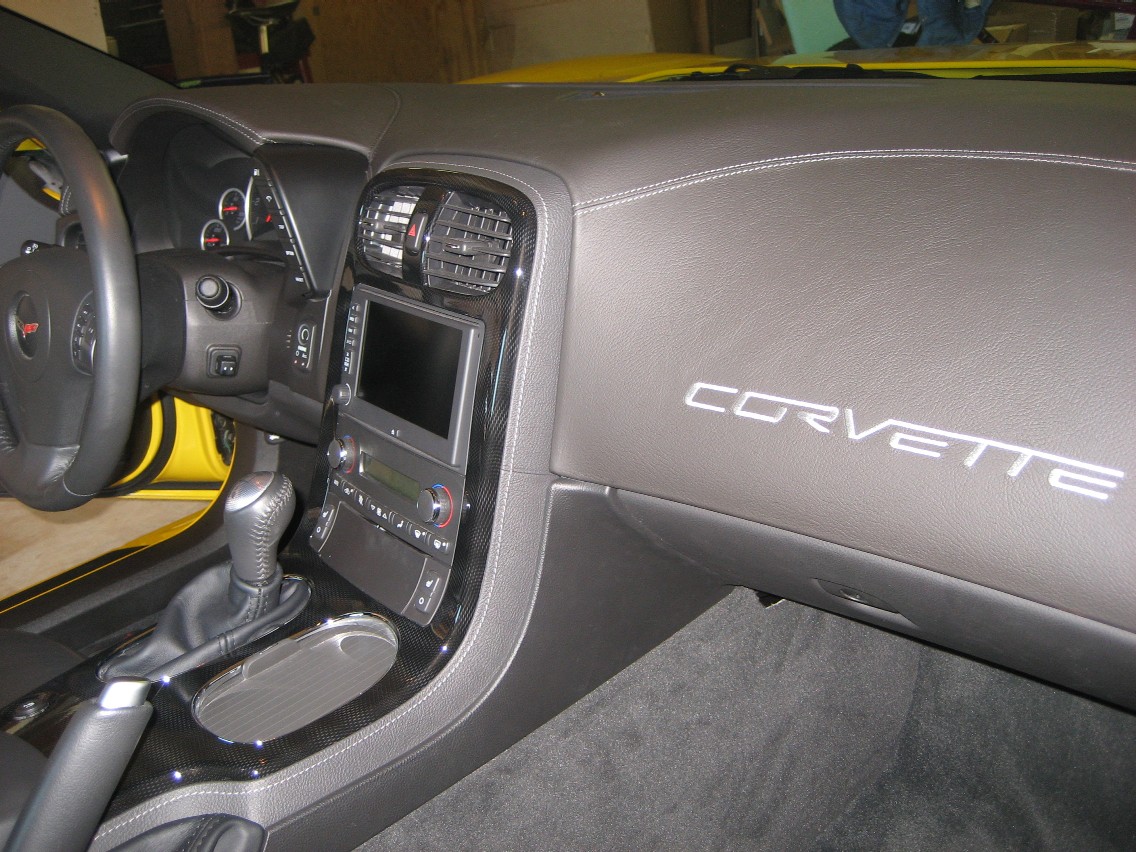
Here's my old "rubbermaid" dash:
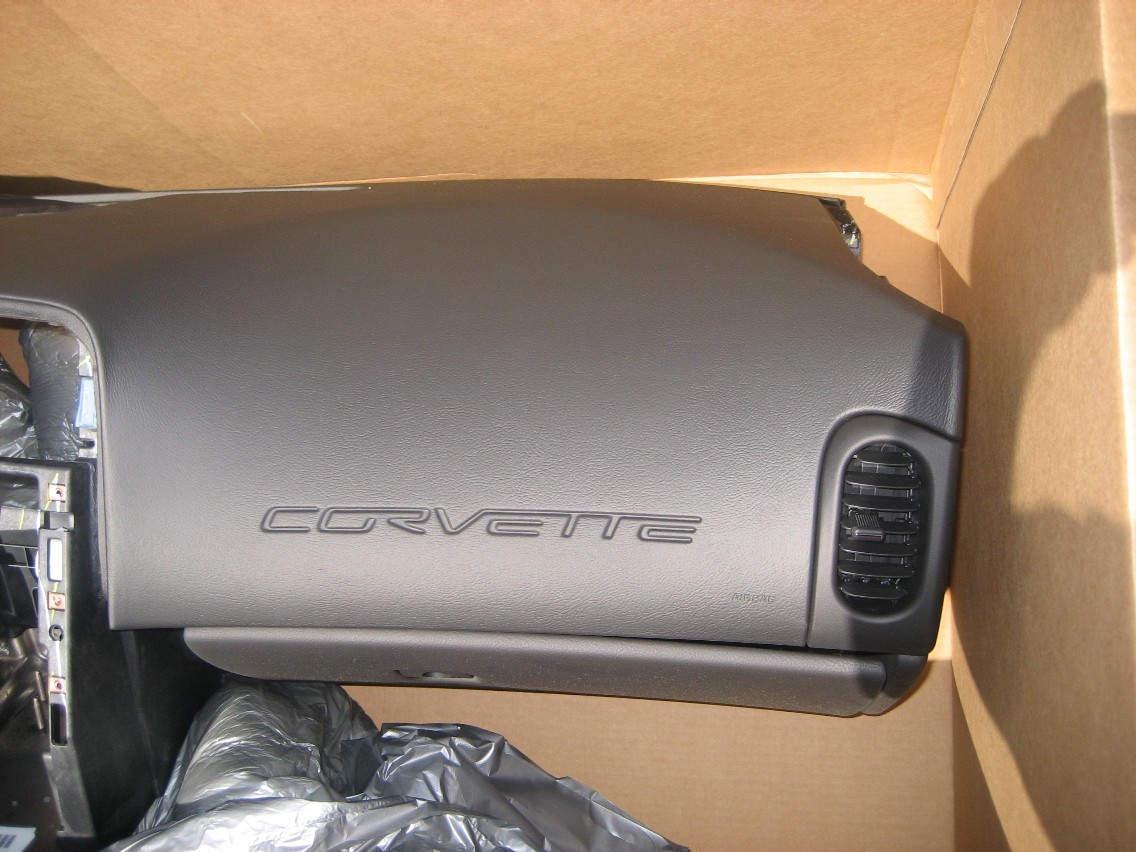
I like the new leather dashes from the 3LZ or 4LT packages a lot better:
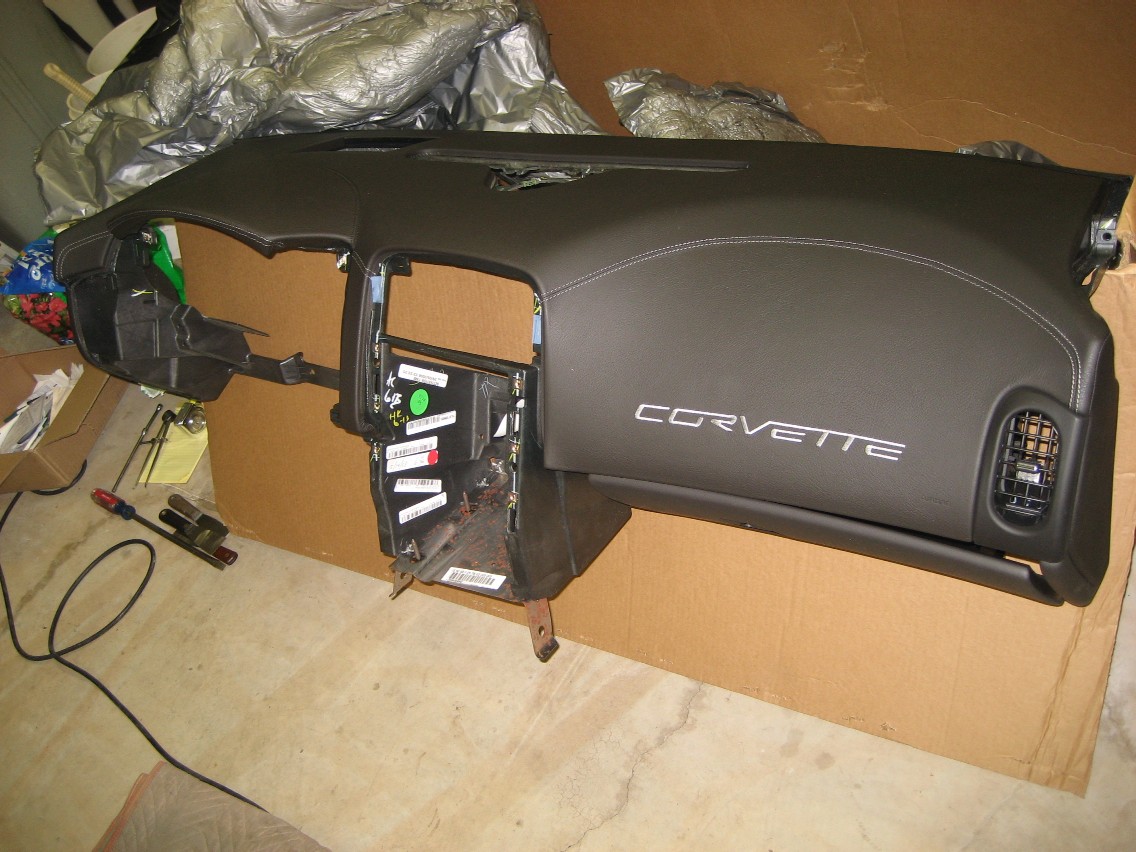
The complete dash is part number 25909990, designed for the '09 3LZ and 4LT packages.
There is a minor difference however.
Here's the earlier dash:
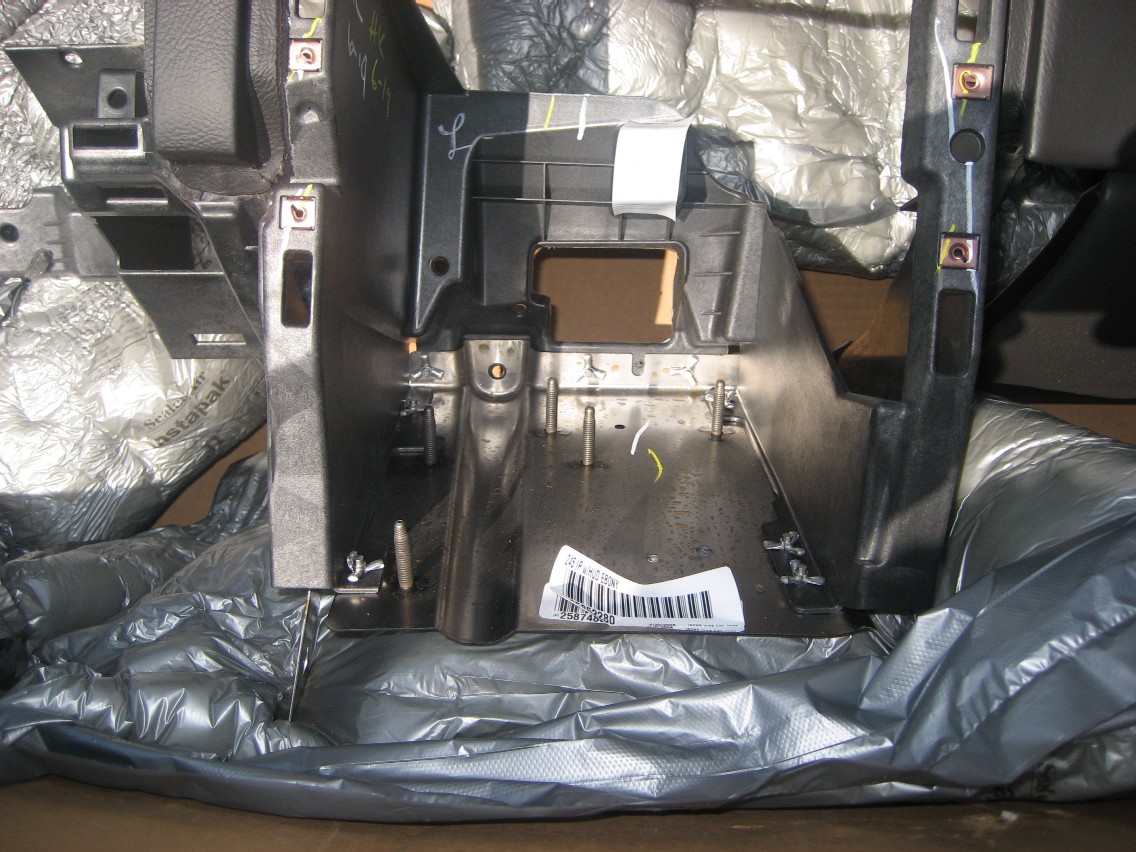
Those five mounting studs are for attaching the airbag module and the yaw sensor.
The three closest to the camera are for the airbag module: two on the left and one in the center.
The two furthest away are for mounting the yaw sensor.
Now compare those locations for the yaw sensor with the '09 dash:
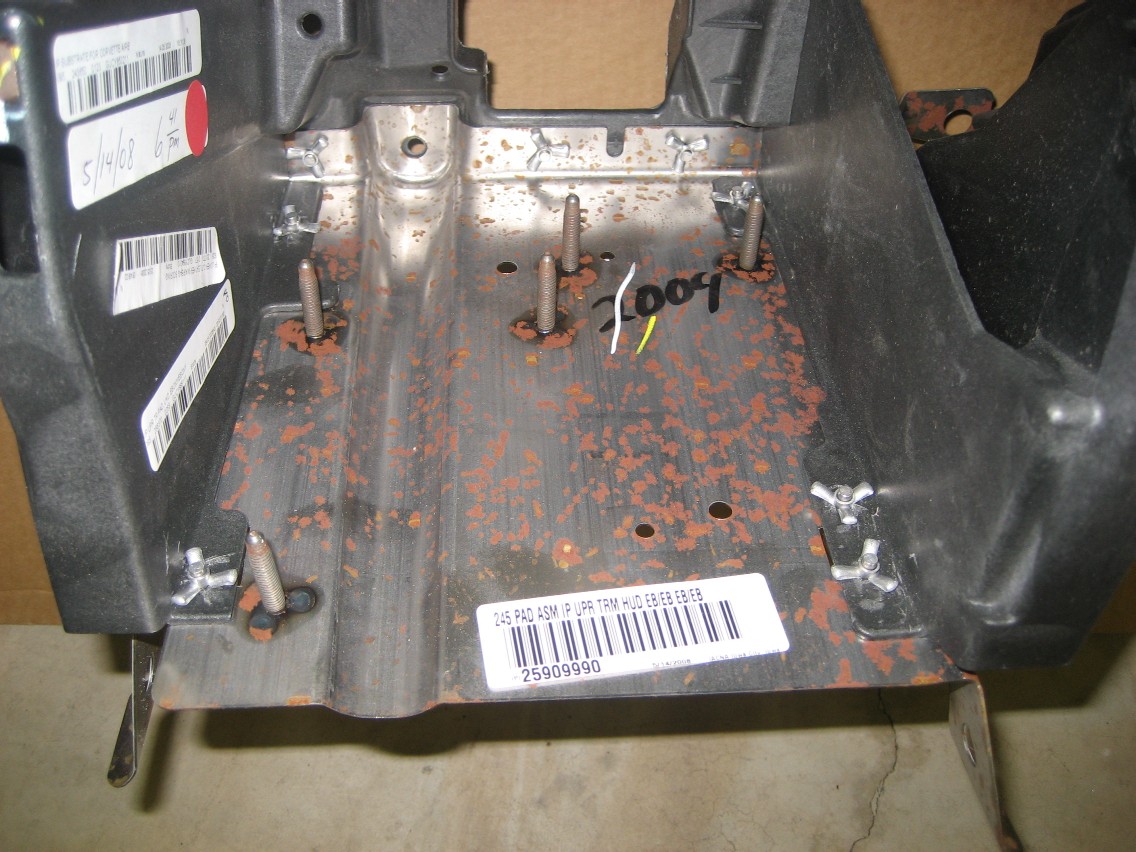
Note that the left stud for the yaw sensor has been moved closer to the right stud.
We'll need to move that stud to the hole to the left of the stud to fit the earlier yaw sensor.
It's spot welded to the steel frame.
Upper Removal
OK, let's start removing the old dash.
You should definitely have the factory Service Manual for this job, because there is a ton of information in there with lots of procedures for removal and installation of all components.
But I'll try to cover the steps involved and show you photos where the Service Manual is either incorrect or unclear.
You might as well start with the defroster grill. It has to come out because there are three screws that hold the dash in place. The Service Manual just shows that you pull straight up - it looks simple, but it isn't so simple because there is nothing to grab to pull on. This is probably the hardest part of the whole job, because most of the rest is just unbolting or unscrewing something.
For removal of the defroster grill, note location of the five clips holding it in place. The manual shows four, but there are five. Three are shown here:
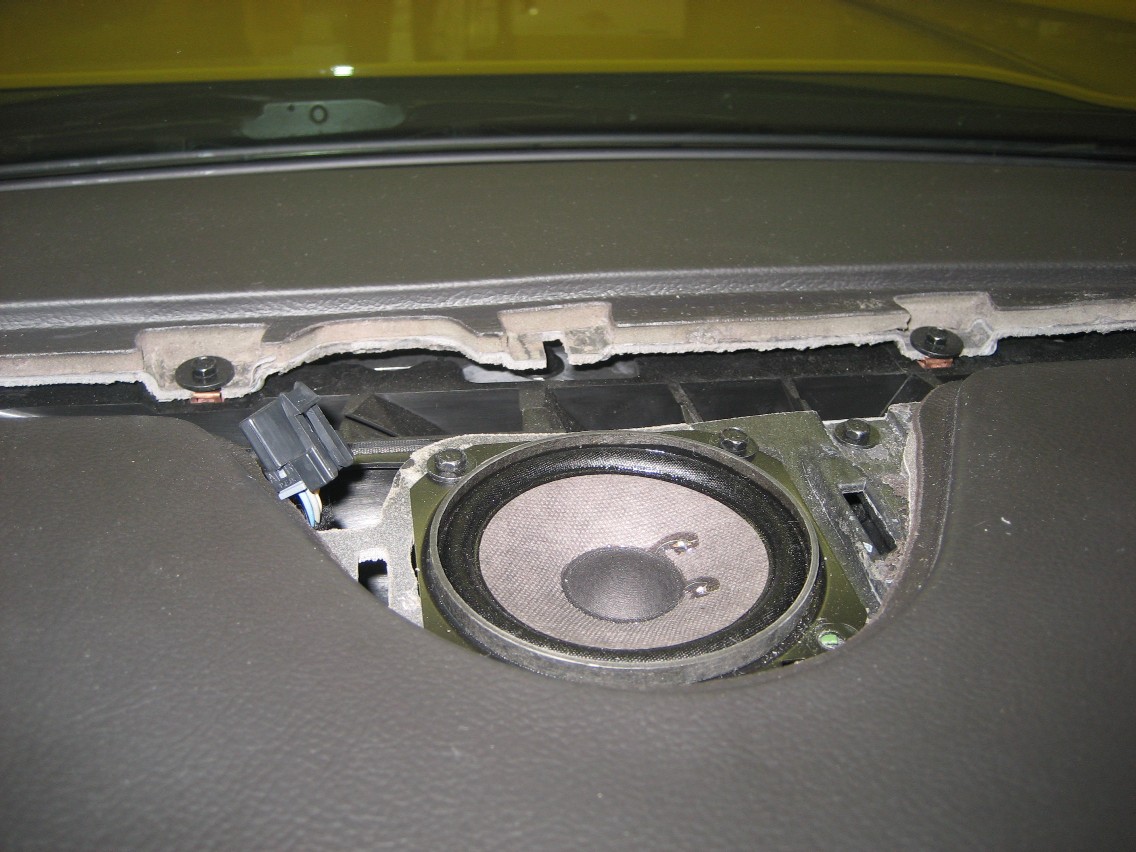
Two are on each side of the speaker, one is at the center, and the two not shown are out near the ends of the grill.
I found a flat plastic picnic knife worked OK to pry the grill up on the right, about halfway to the end. Then I worked a flat putty knife towards the end, being careful not to damage the instrument panel or break the plastic grill. By prying up, the outer clip finally popped loose. Then I worked my way back towards the speaker and the second clip popped loose. I did the same on the left and finally got all five to pop loose.
I disconnected the sun sensor, with the connector shown left of the speaker.
You can see the three 7mm screws with washers holding the instrument panel in place.
You'll want to remove the speaker as well:
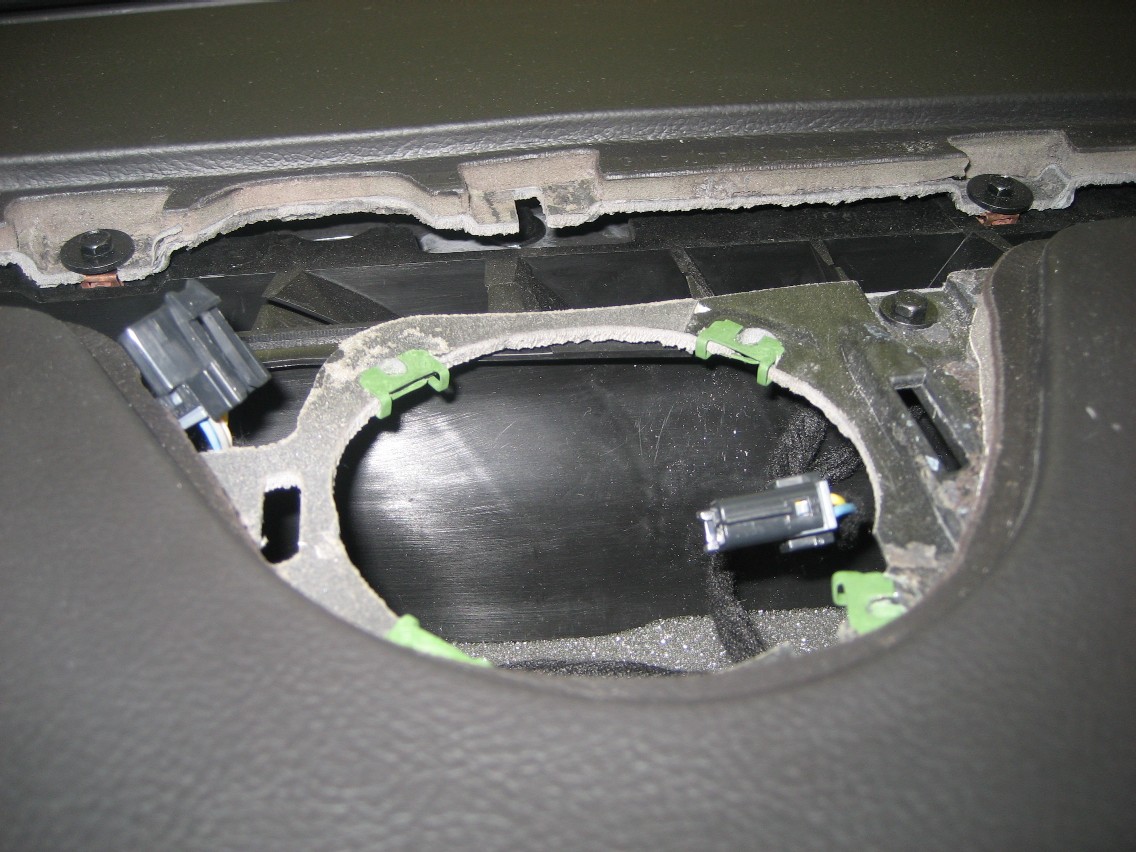
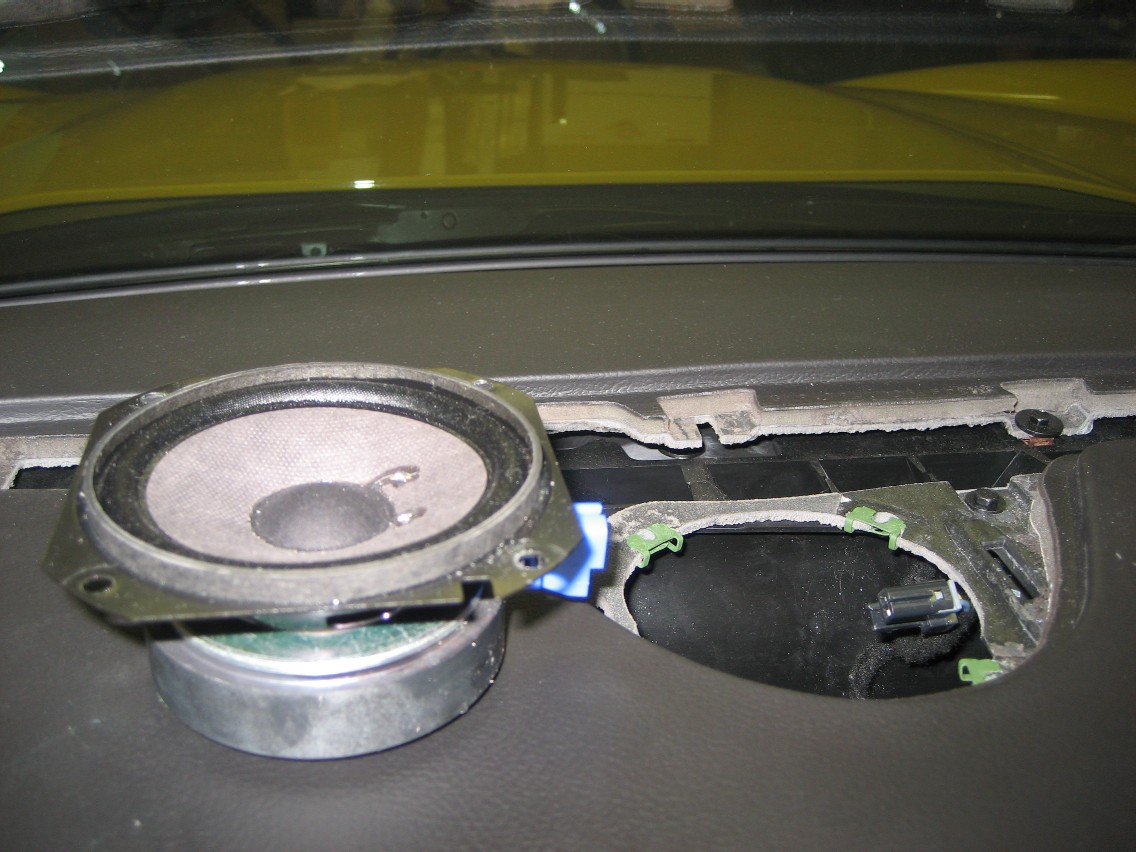
Next, you might want to remove the windshield pillar trim.
It's easy. You just pull it away from the pillar. But there's something not noted in the Service Manual. You must first pull away the trim on the door hinge pillar, because the windshield pillar trim is also held in place with a clip:
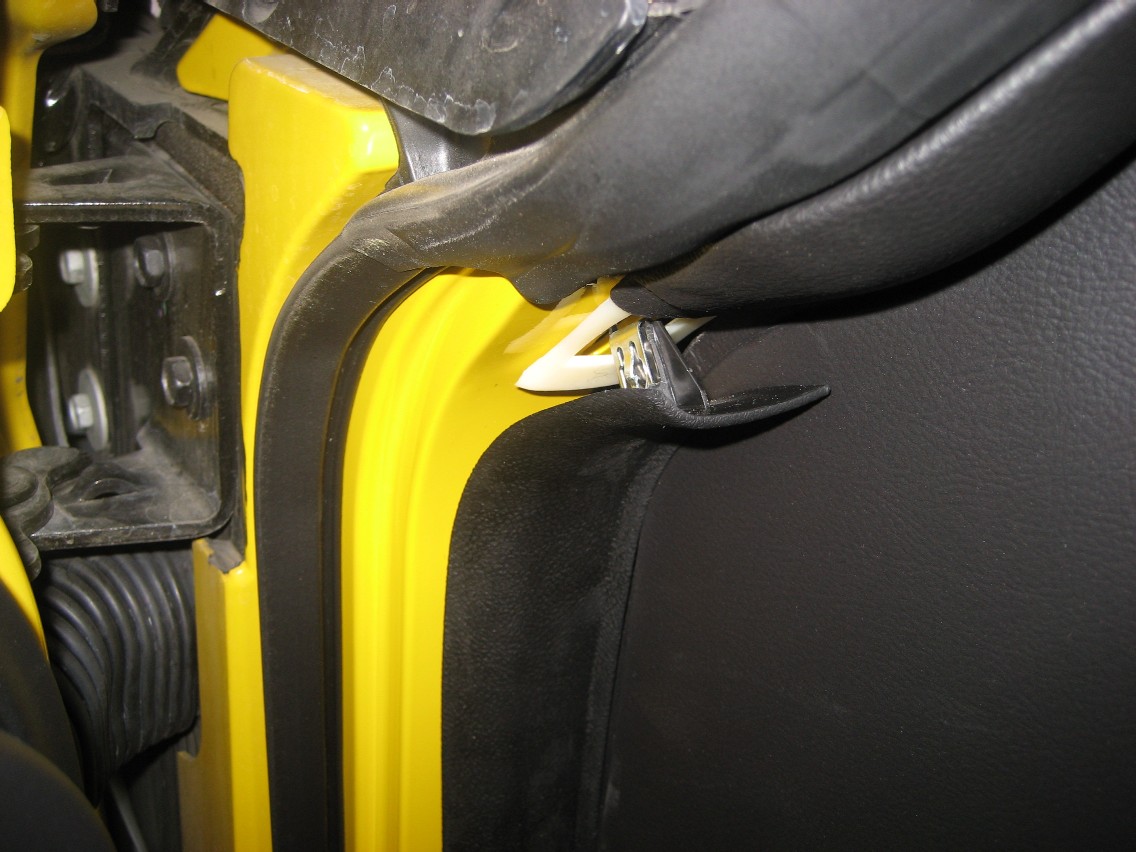
It's the same on both sides.
Here's a photo of the right windshield pillar with the trim removed:
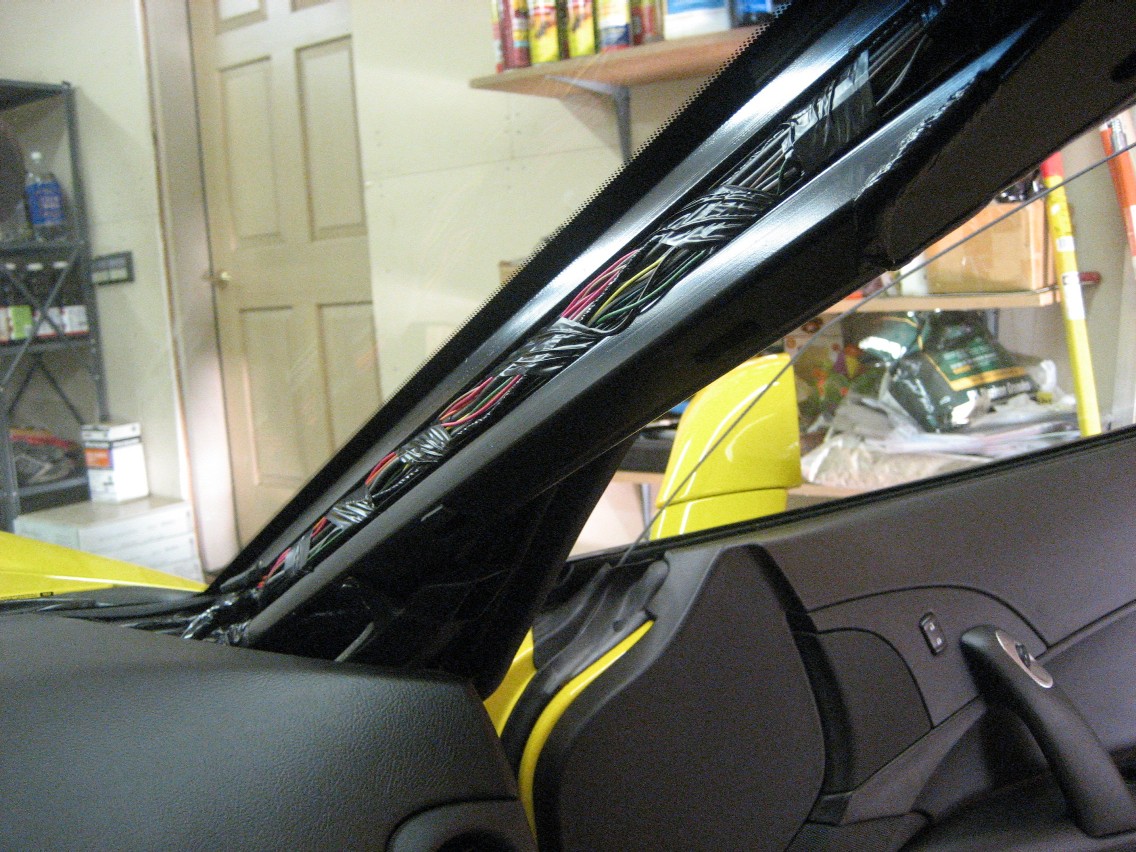
The left side is the same, but if you have Onstar, you'll need to disconnect the microphone at the connector as you pull out the trim.
Once the trim is removed, you will see the two nuts (one on either side), holding the instrument panel in place.
The Service Manual says there are four, but that's incorrect - one on each side.
Here is the left one:
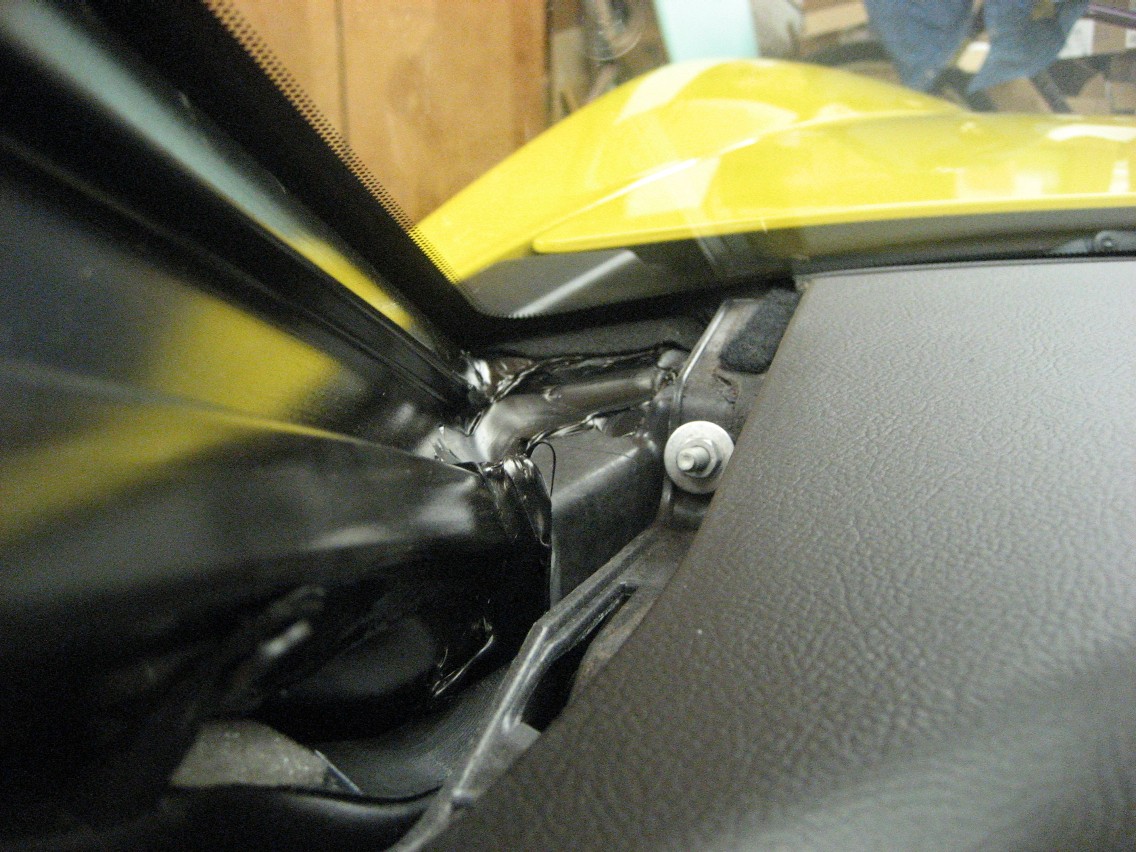
OK, thats's the upper stuff. Now on to the lower stuff you must remove.
You might as well start with the center console, which is the most time consuming.
The center section:
Rather than duplicate what I have written already, here are a couple of links for removing the center console:
http://www.kawal.net/navigation.htm
http://www.kawal.net/F55%20Console.htm
Both of these show lots of photos and details for removing the console. The hardest part is figuring out how to release the tabs on the electrical connectors. Once you figure that out, it's simple. You might swear a little during the process.
Once you get the console out, unplug both the radio (or Nav unit) and the HVAC (heater) control, and remove them.
This is what you will then have:
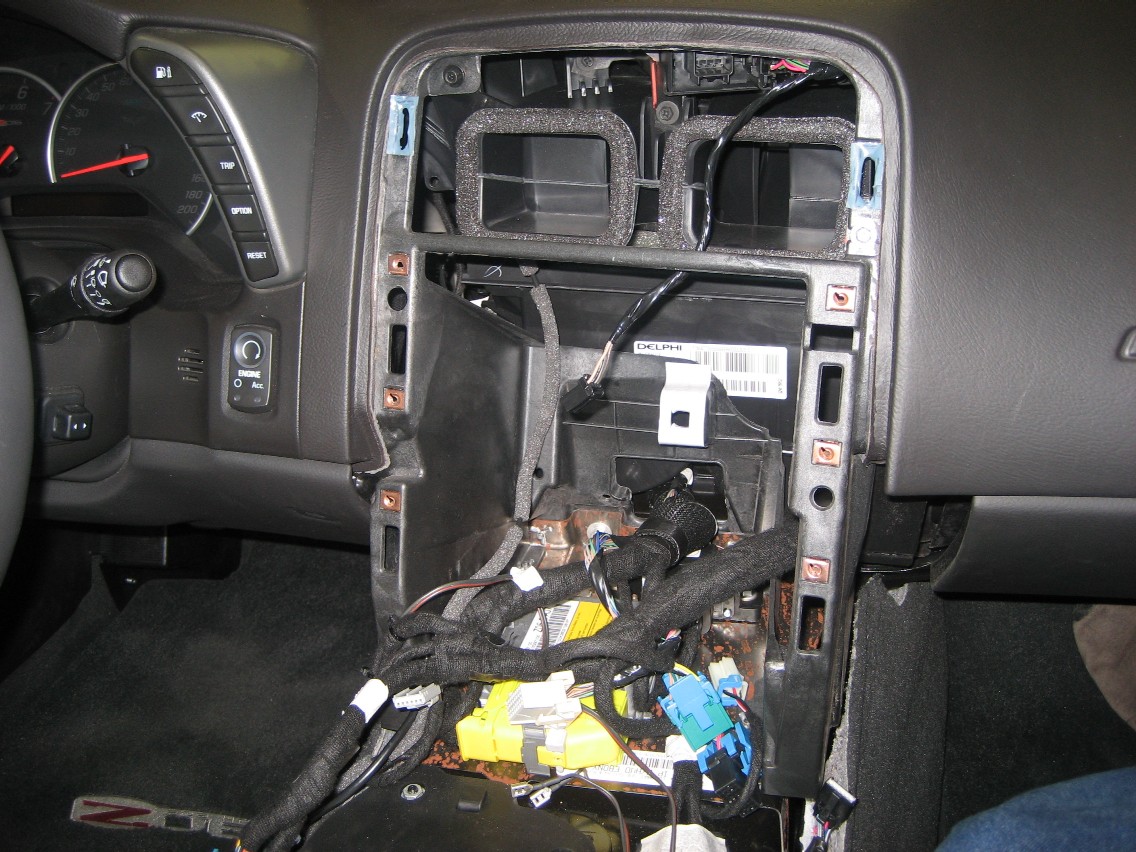
It looks pretty daunting, but those connectors are easy to put back in place, as are the radio and HVAC control.
What you see now, below the wiring cables, are the yellow airbag control module and the black yaw sensor in the back.
Both need to be disconnected, but as a precaution, you should disconnect the negative terminal of the battery and wait for one minute before disconnecting the airbag module.
All of these cables will be pulled through the instrument panel as you remove it.
If you follow these cables to their ends, you'll see that the blue wire for the ebrake switch must be removed, because the center harness must be pulled through the opening in the back of the dash panel.
To remove that connector, here's a photo of it:
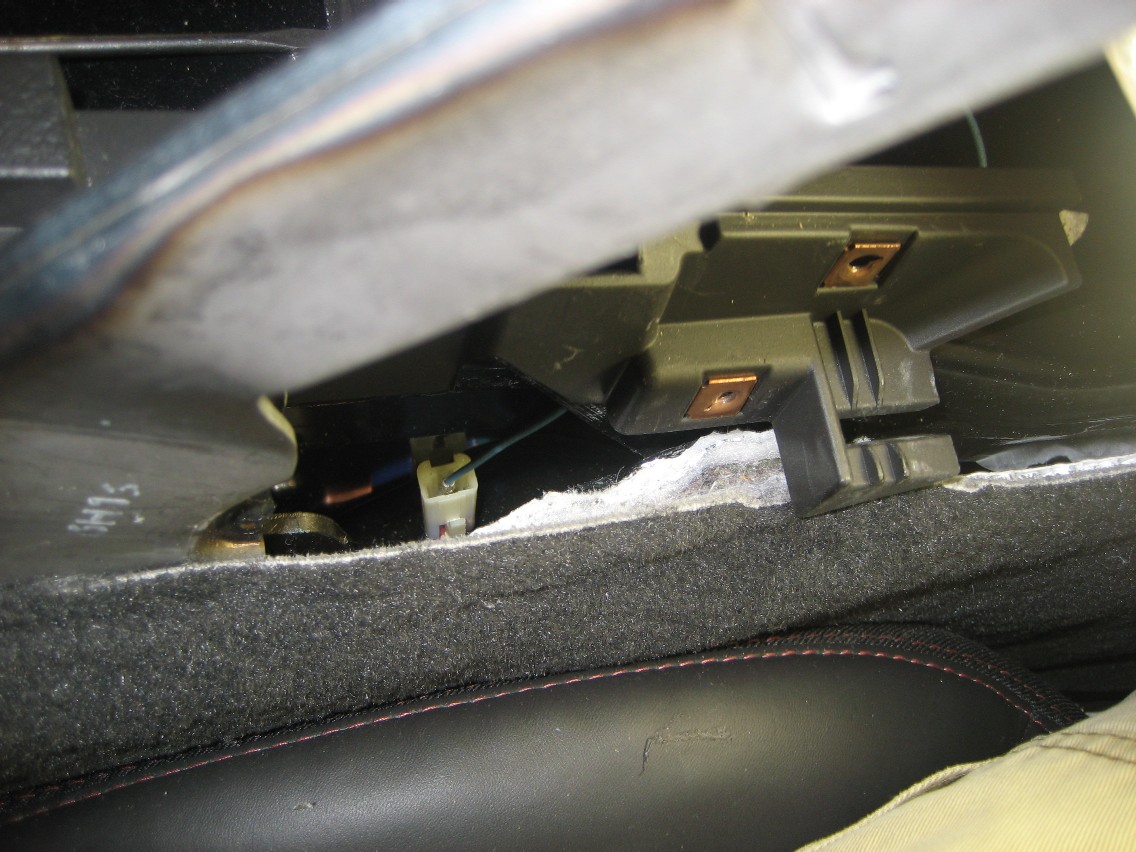
To get to the connector, you must also remove the ebrake handle and boot.
To remove the handle, push the boot down (way down) to expose the Phillips head screw holding the handle in place:
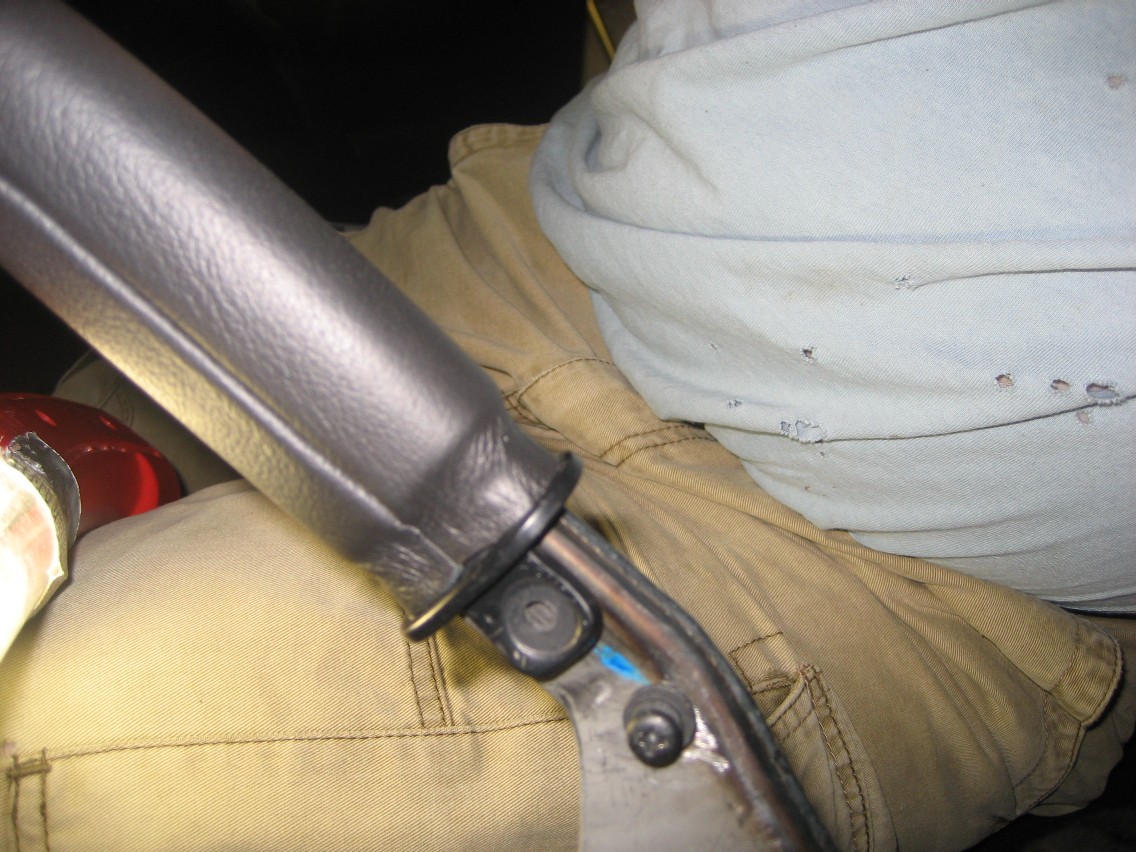
The above photo shows the screw set back in its hole after the handle has been pulled up. To remove the handle, just pull the handle with the button straight off of the shaft. Pull hard and it will pop loose.
For the boot, pull it straight up to release the clips.
Now you can get to the switch connector and remove it.
Ok, that's the center area to be removed.
Here are two 7mm screws with washers that hold the dash in place:
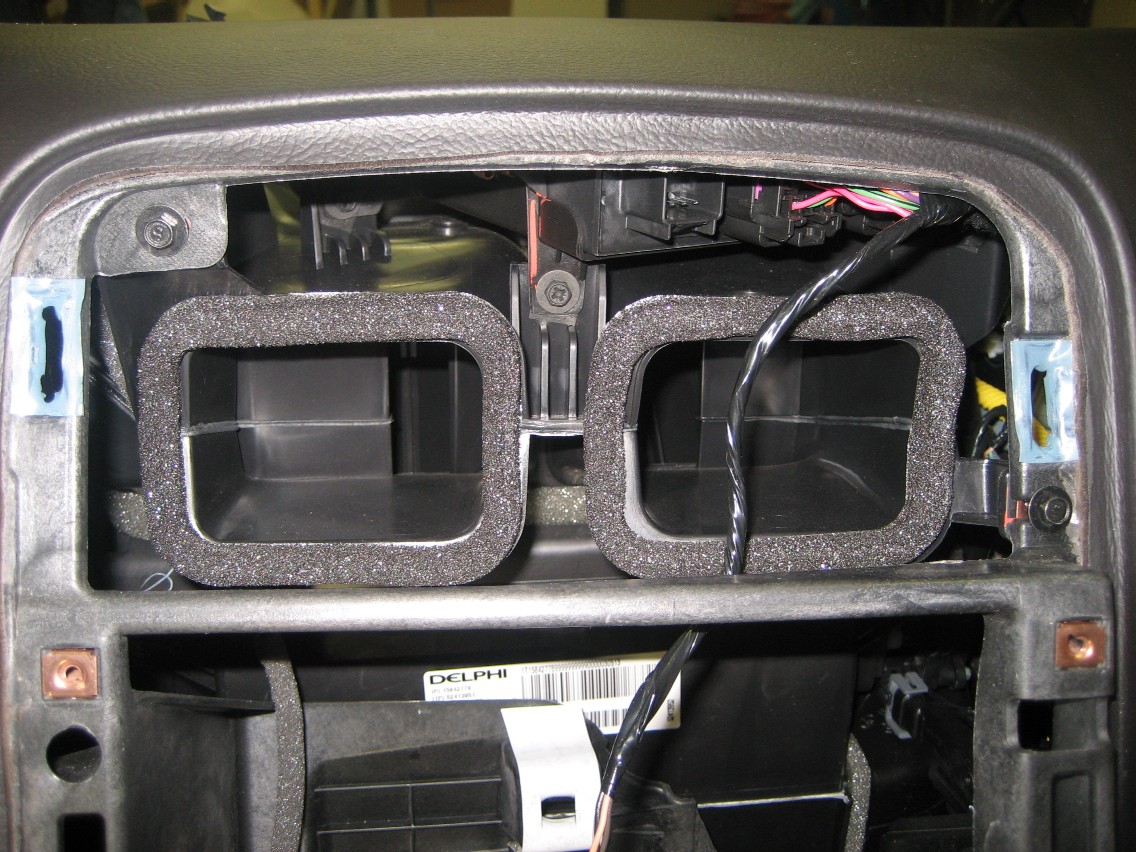
and the nut in the center that must be removed:
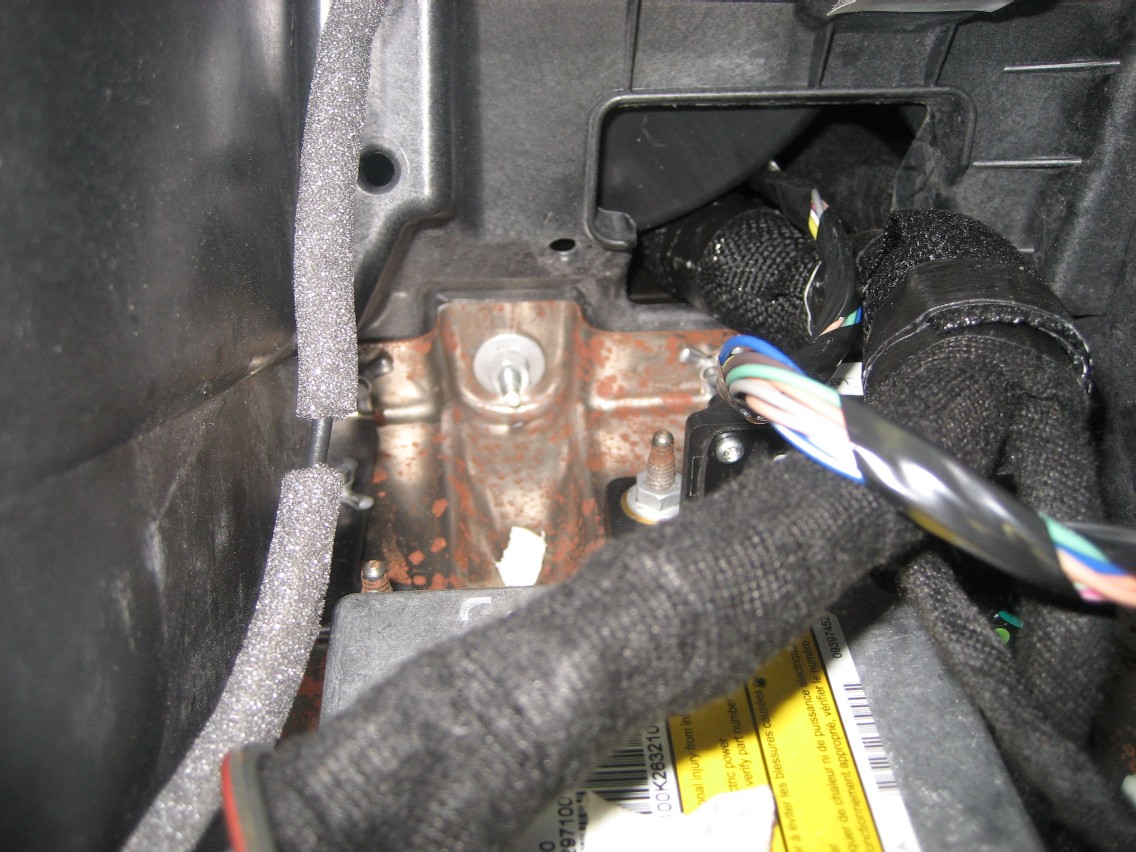
Also remove the left and right 10mm bolts holding the console to the drive tunnel:
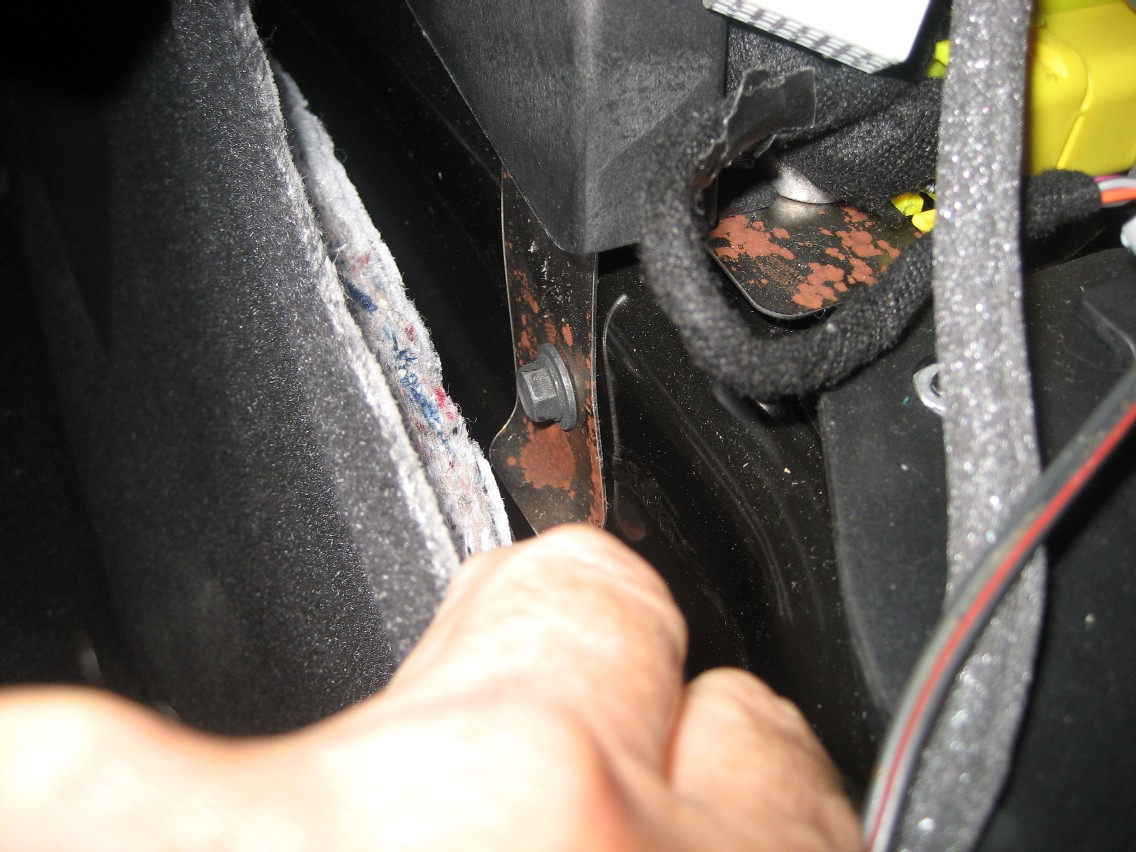
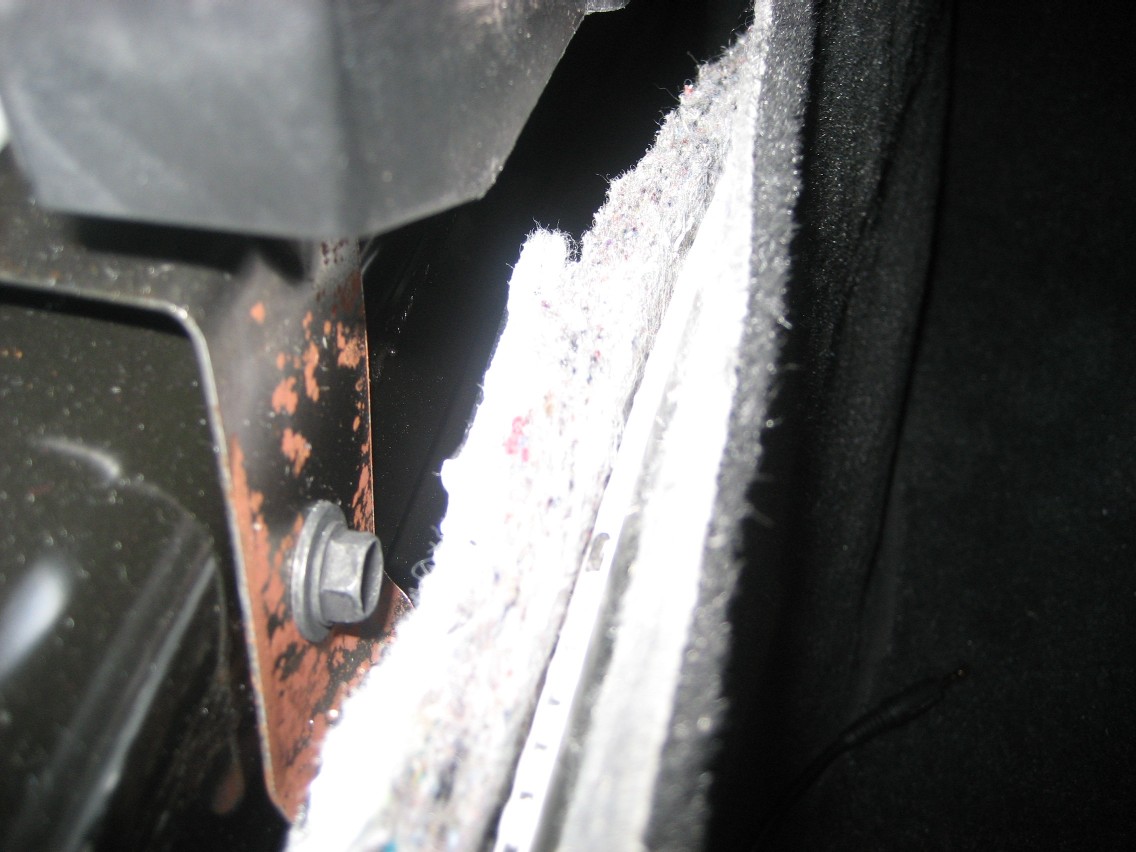
On to the right side.
First, remove the glove box compartment by releasing the limit cable on the left, then letting the compartment door fall after pushing in the two tabs that keep it from falling open.
Remove the compartment trim. Here are the two right screws:
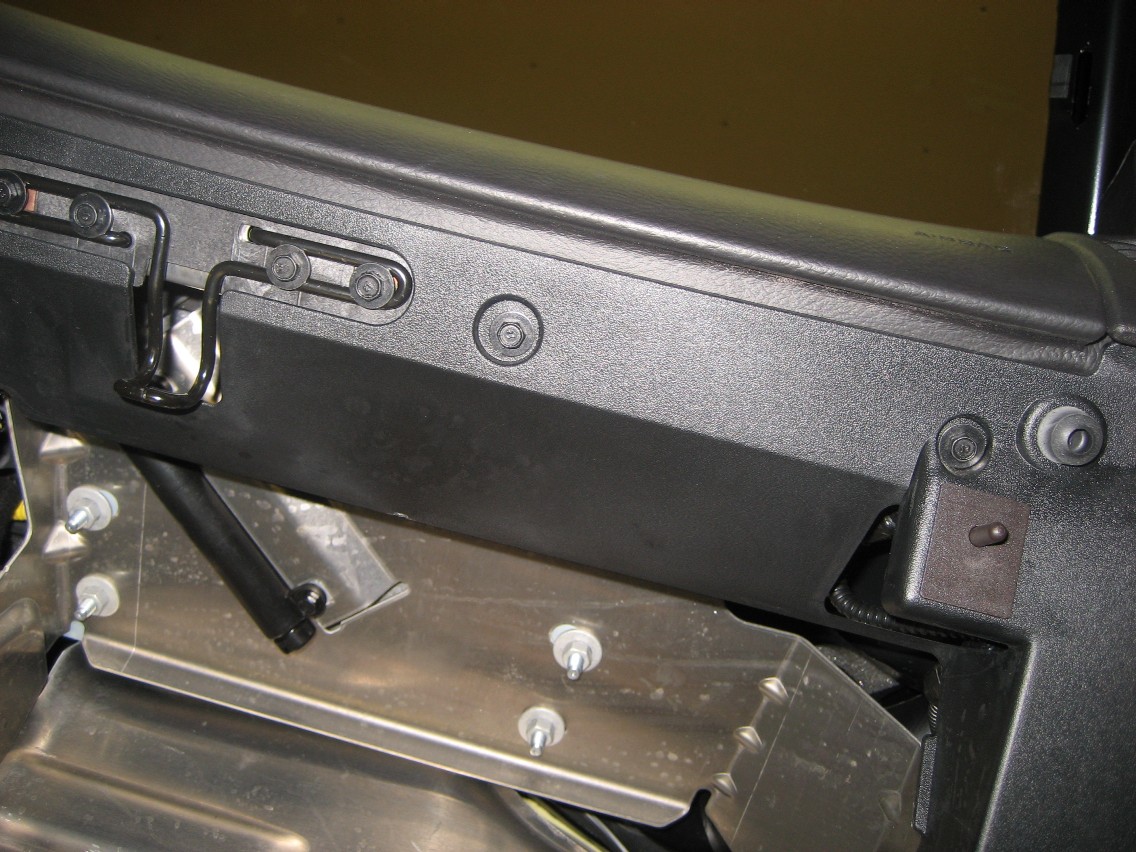
and the left screws:
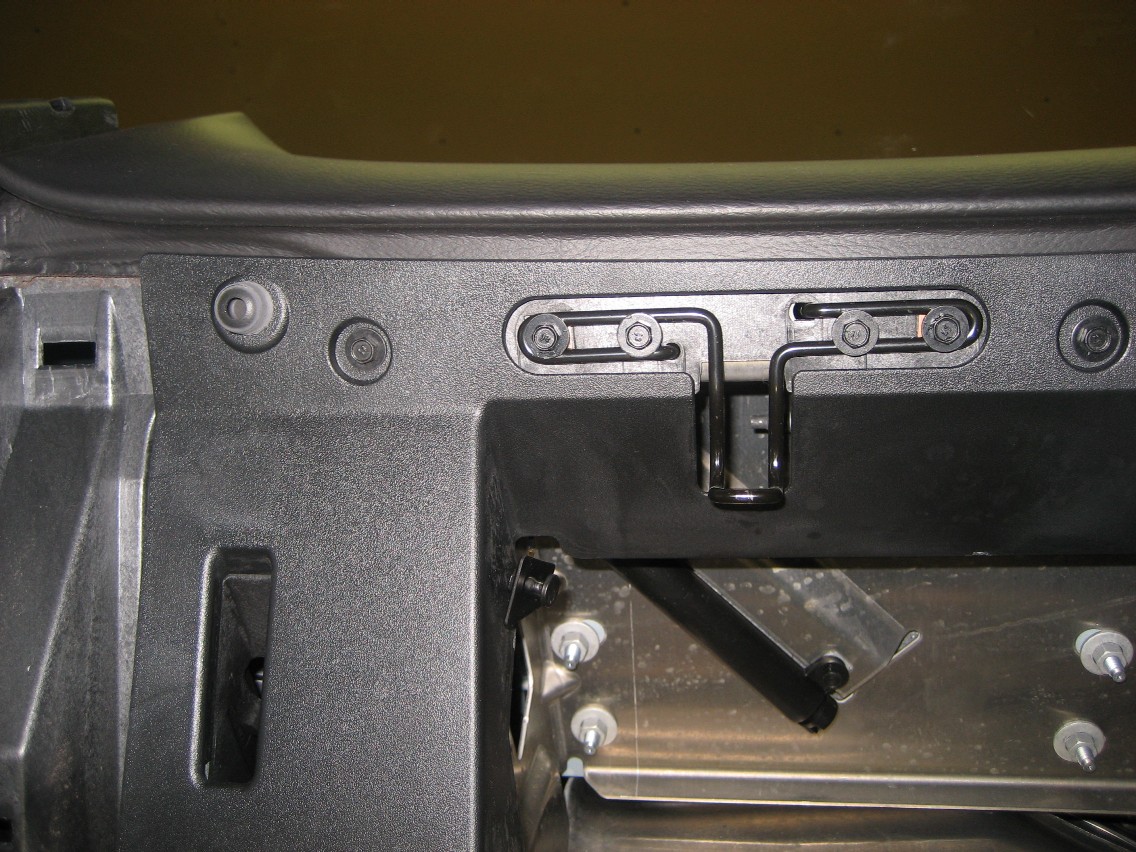
In the photo above, see the four screws that hold the wire latch in place? Remove the two closest to the center, because those hold the dash to the frame.
Remove the compartment trim by pulling down.
Also, remove the insulating panel under the dash by pulling the two plastic fasteners straight down.
Now remove the two 10mm compartment bolts:
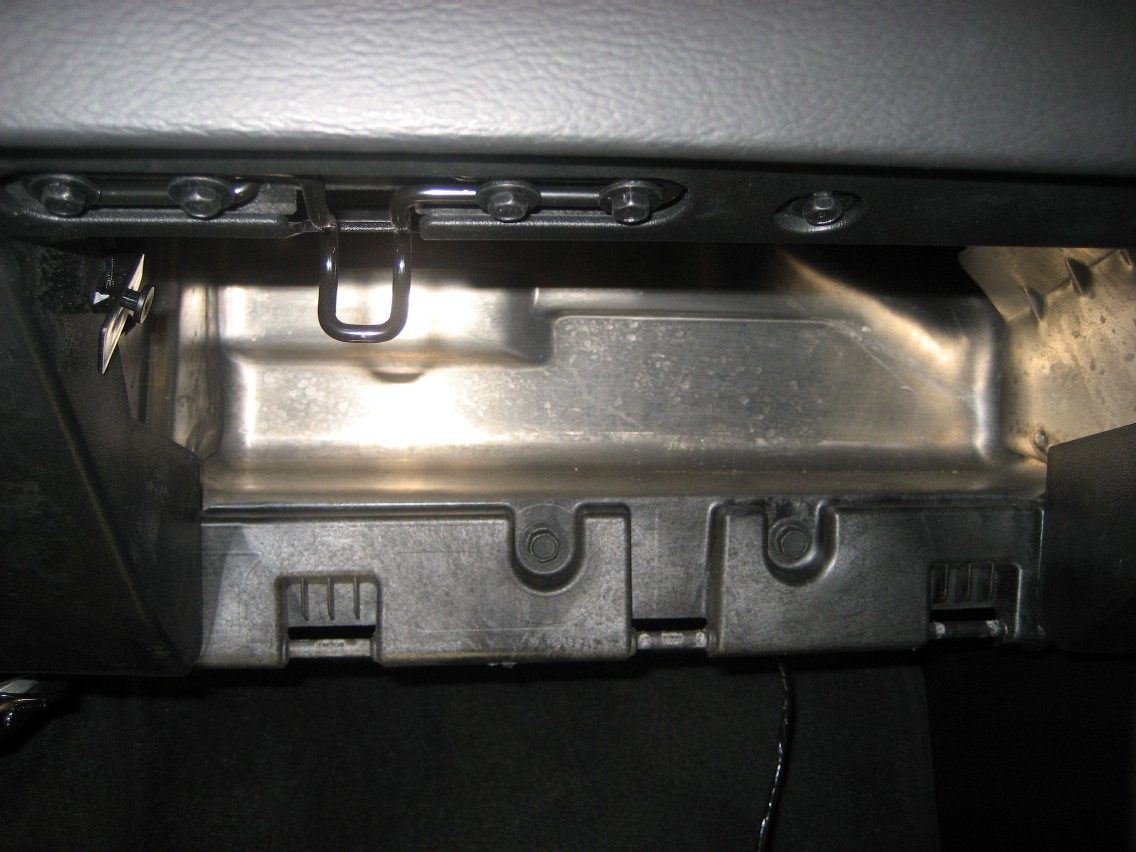
Next, there are three 10mm bolts that hold the dash to the passenger airbag module.
Here is the left one (look way up under the dash):
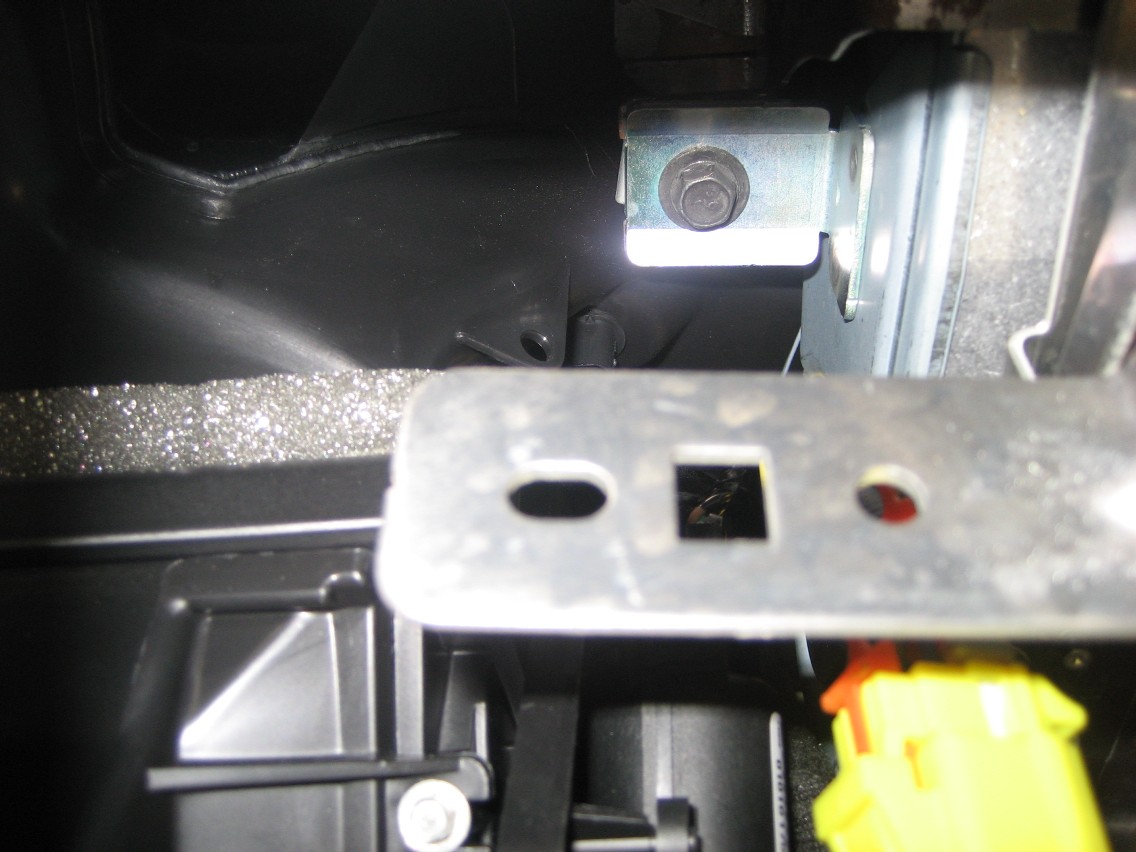
Here is the right one (look way up under the dash):
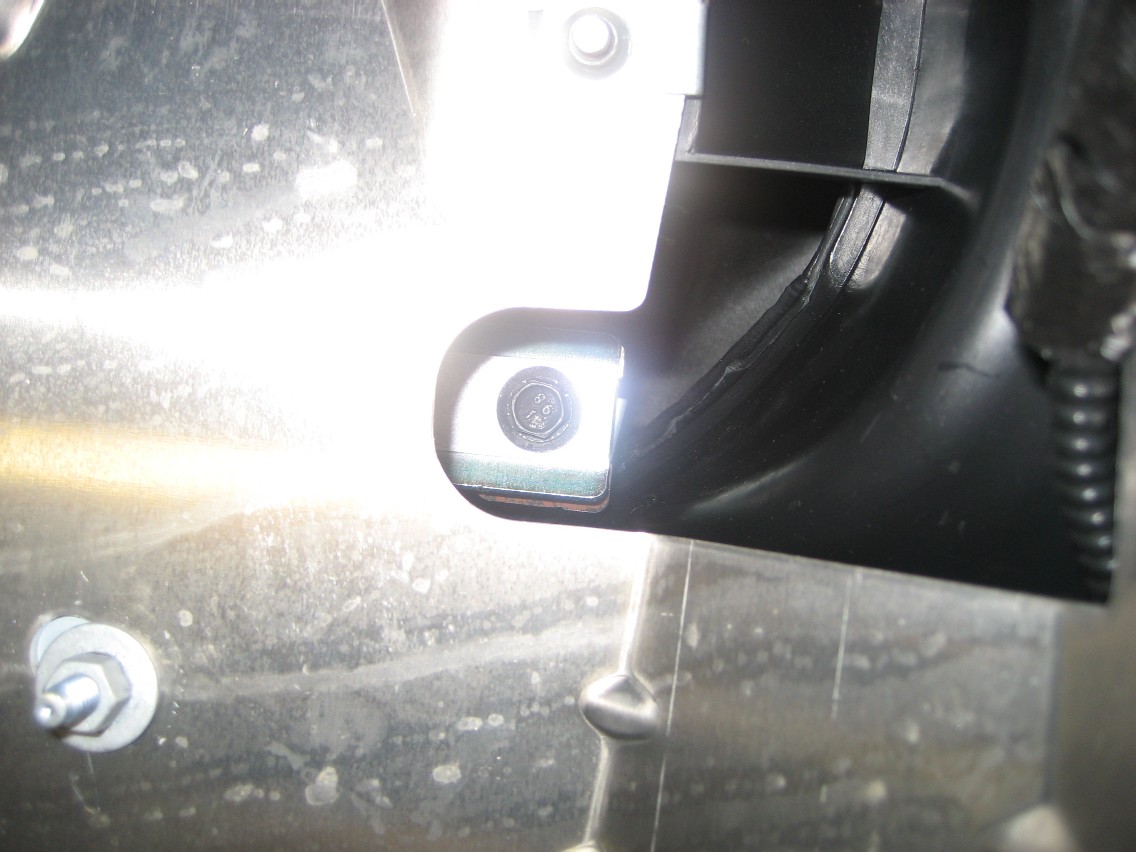
Here is the center one:
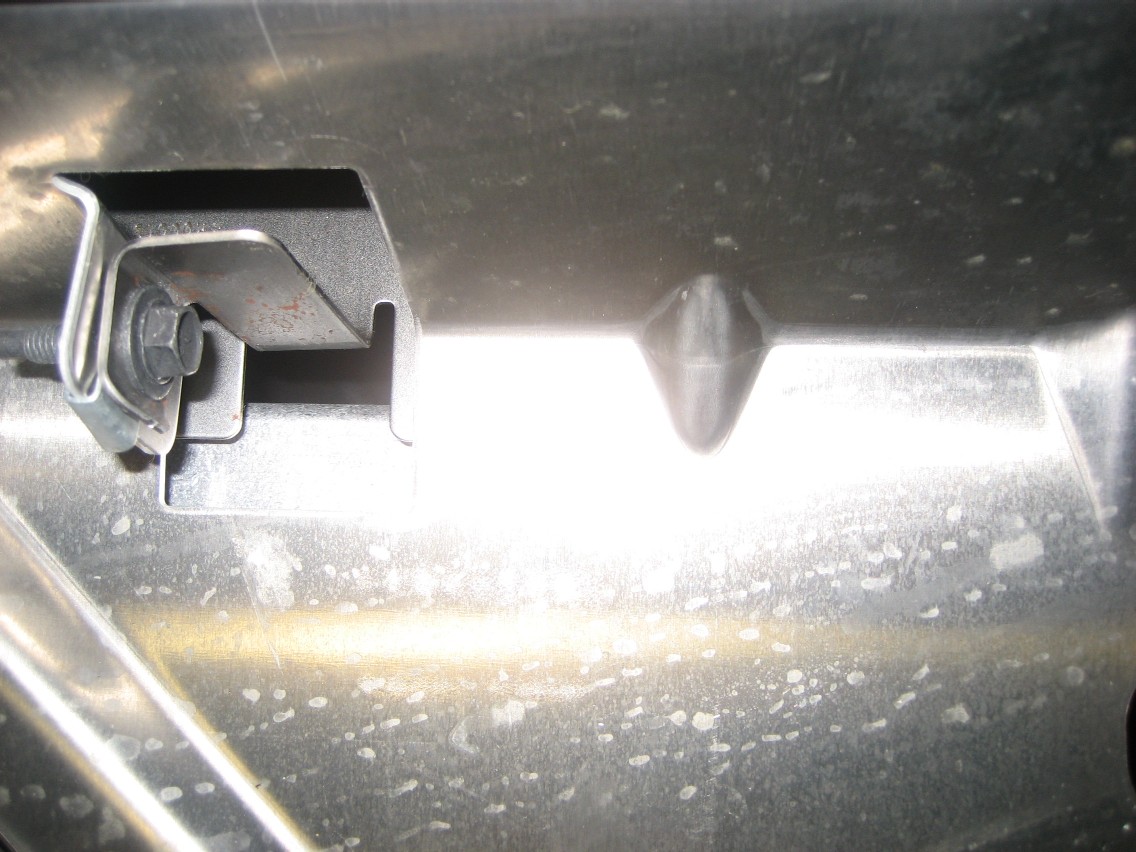
Finally, on the right side of the center console, you find this 10mm panel bolt to be removed:
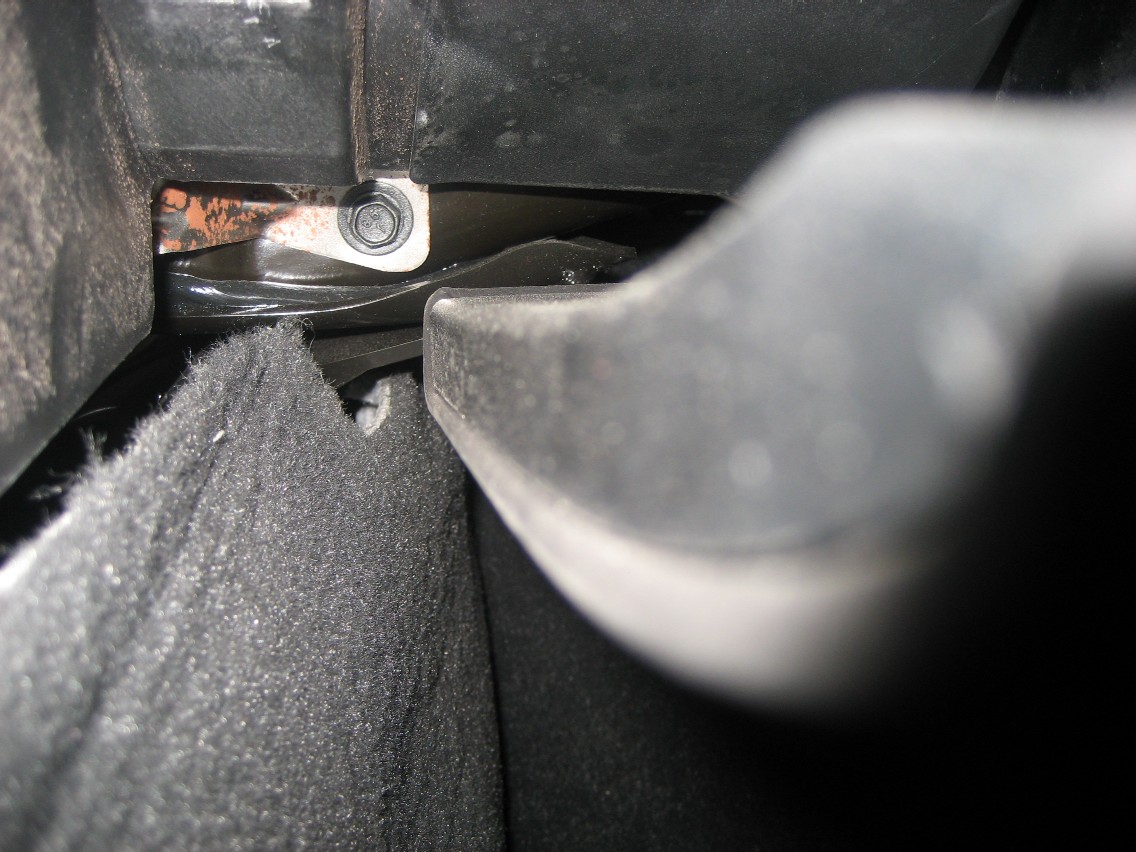
OK, that's all of the screws and bolts to be removed on the right side.
On to the left side.
It's easiest to remove the steering wheel first, to get it out of your way. There are a few tricks that the Service Manuals omit.
First you must remove the steering wheel airbag module, so to be safe, remove the negative terminal on the battery.
Removing the airbag module is about a 30 second job, IF you know how to do it - and the Service Manual isn't too clear.
First, point the steering wheel straight ahead and you'll see some small holes on either side behind the steering wheel. The manual says turn the wheel so one is at the top, but it's easier to keep it pointed straight ahead.
You'll need a 5/32" or 1/8" punch or something similar with a blunt end. Push the punch straight into the hole with it level to the ground, but first here are some photos to show how the airbag module is attached:
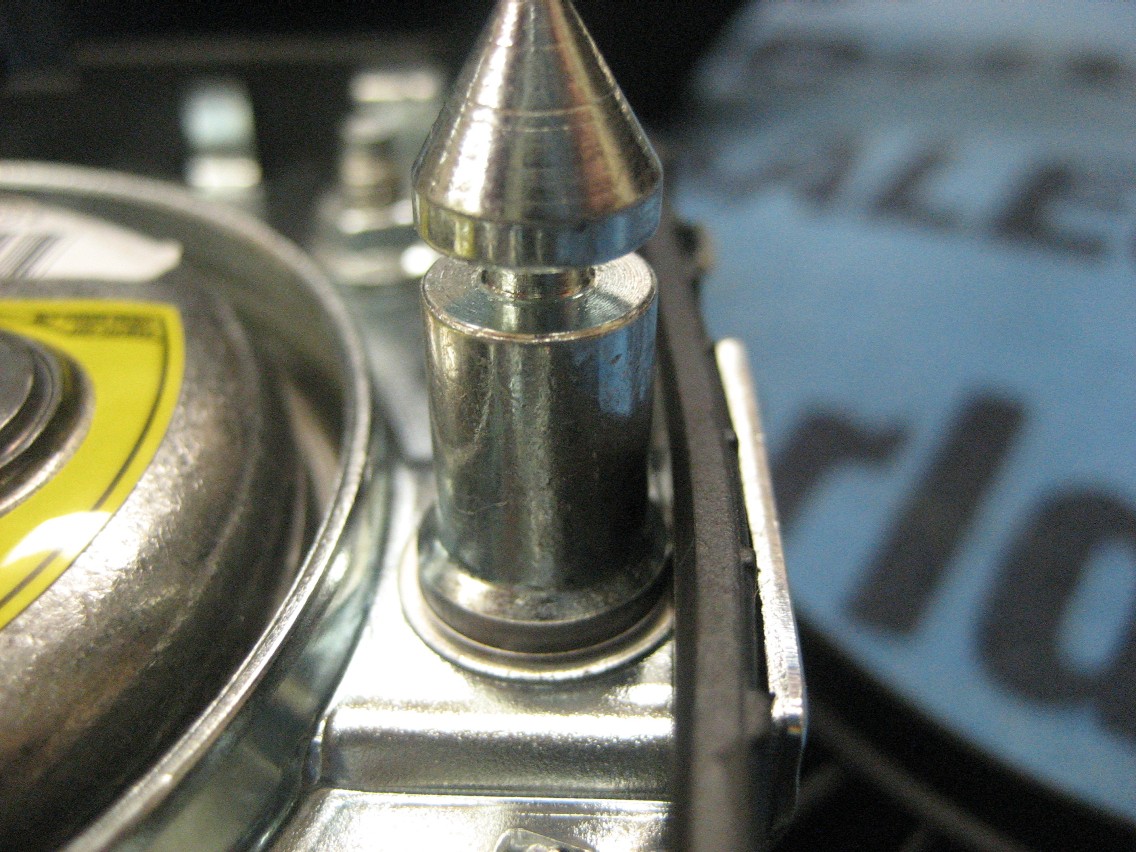
There are two of these locking pins on the airbag module, one on either side.
As you push the airbag module onto the steering wheel, a wire spring pops into the groove in the pin.
Here's the wire spring in the hole for the pin:
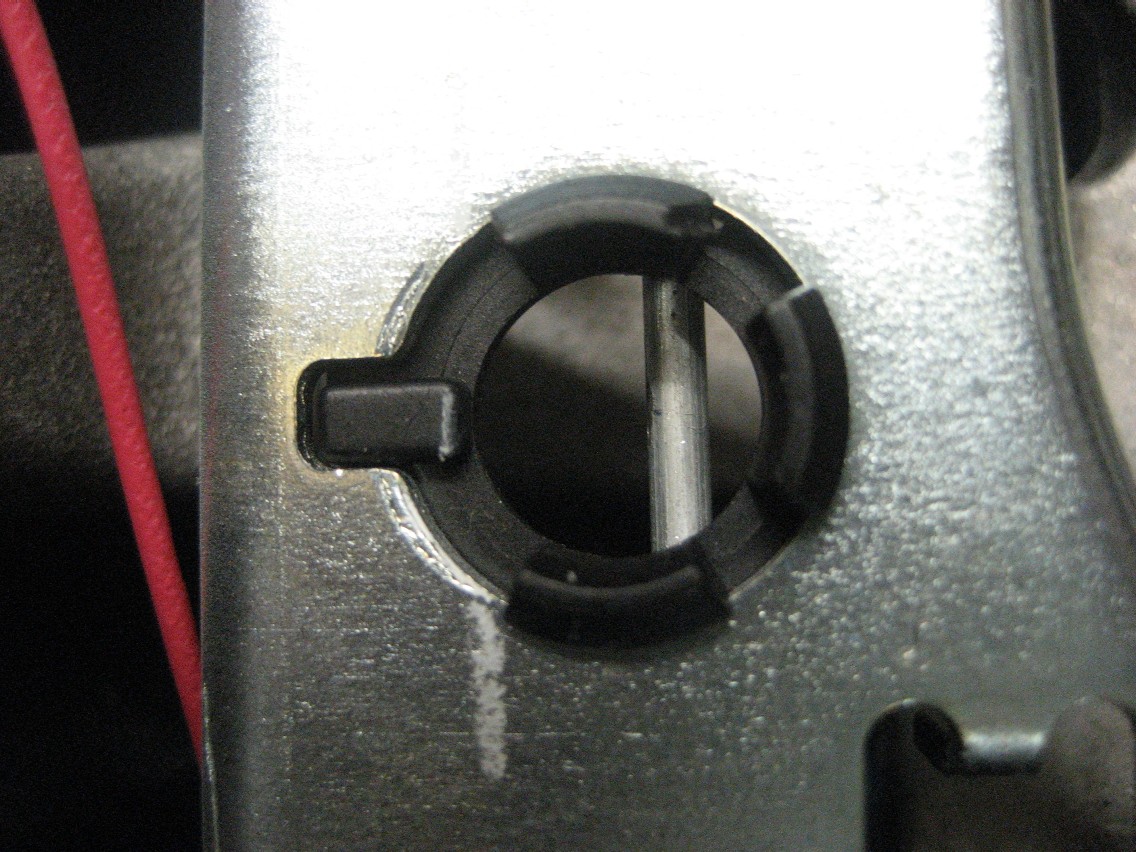
A view from further out:
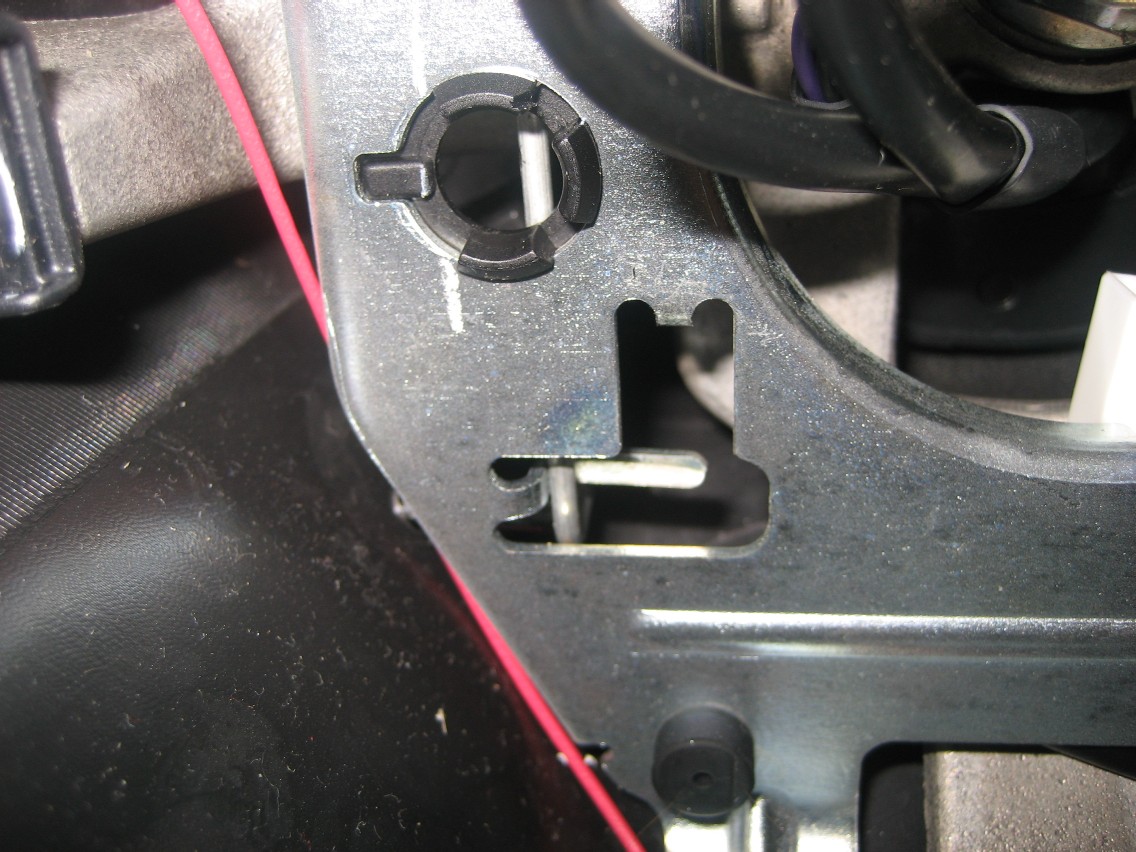
To release the airbag, you must push the wire spring towards the center of the wheel.
See the wire spring below the round hole? That's where you push with the punch.
Here's a photo of the spring pushed:
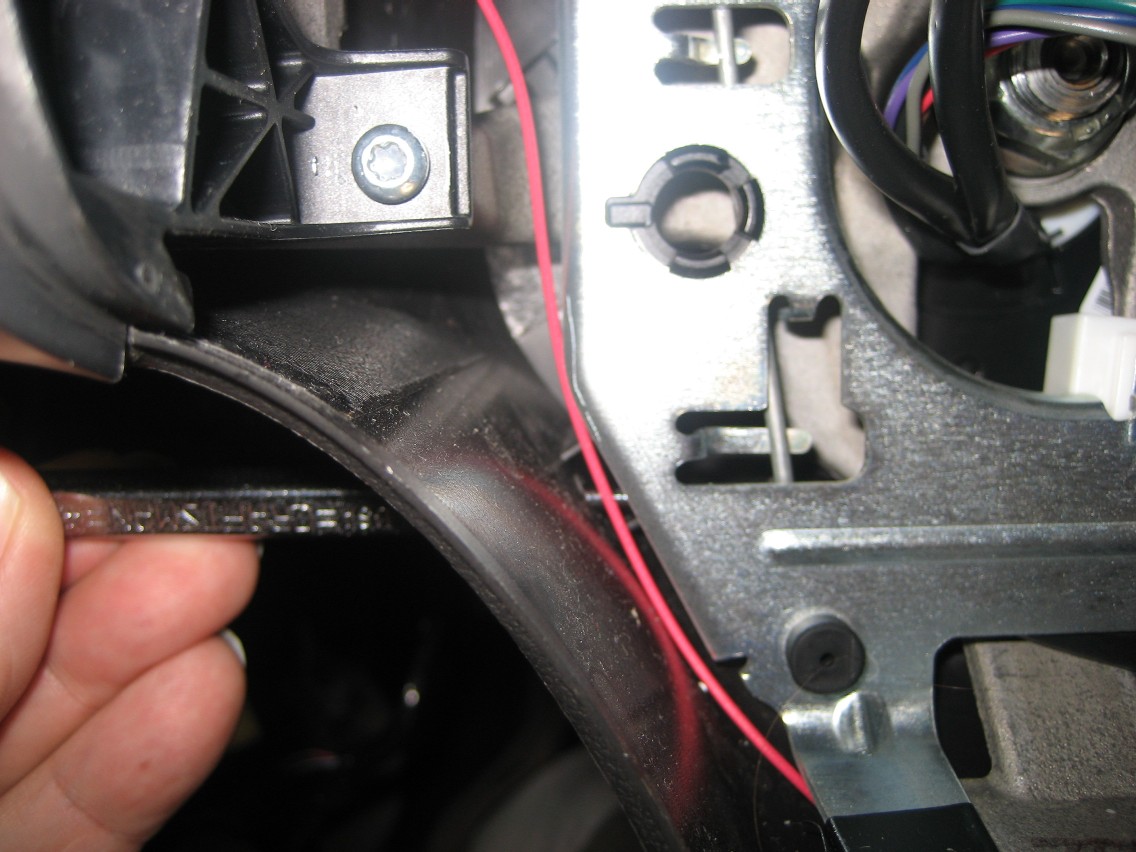
Keep the punch horizontal, straight toward the center, and you will push the spring to unlock the airbag module.
Pull on the module on the side you release, then simply do the other side the same way.
When you release the module, lay it face up in front of you:
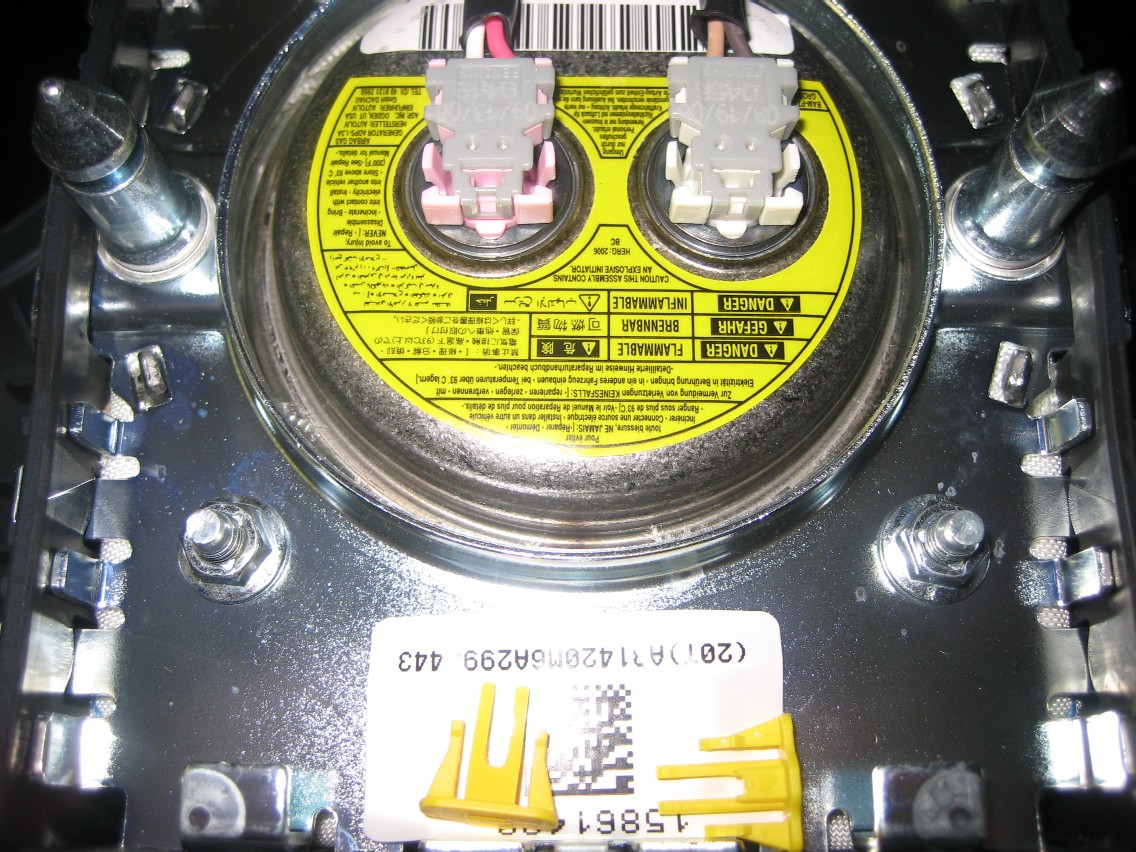
In the photo above, the yellow locks have been pried up from the two connectors.
To release the connectors, squeeze the tabs inward.
Here's one connector removed:
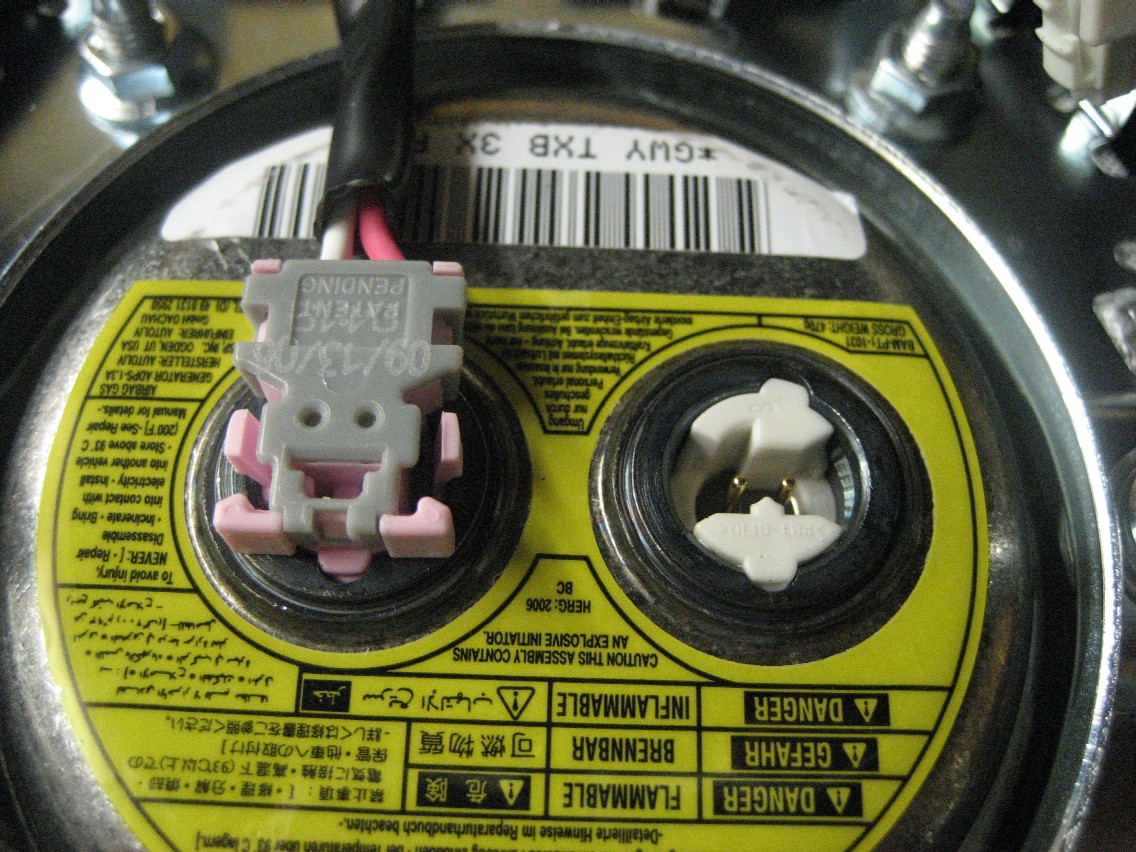
Set the airbag module in a safe place and your steering wheel will look like this:
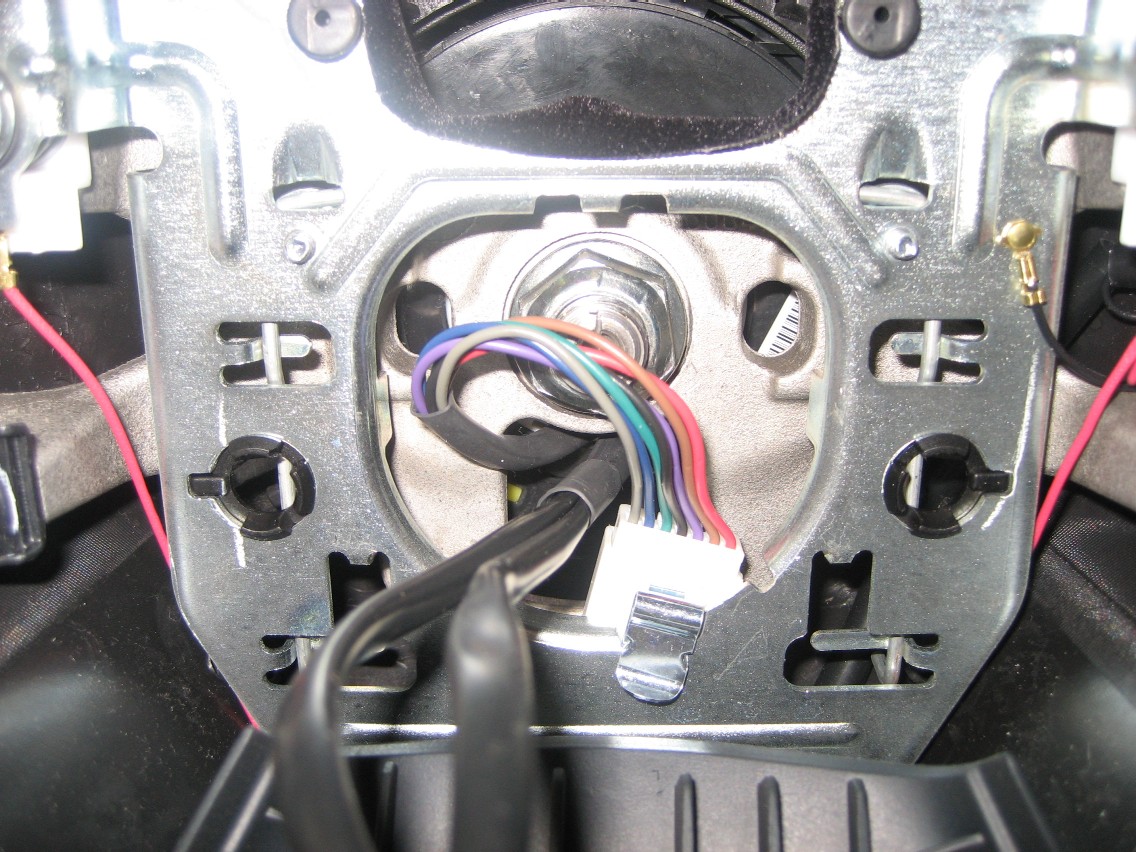
Unplug the white connector and move the wires away from the nut holding the wheel in place.
You'll need a 21mm socket to remove the nut, but here's a trick I learned many years ago for removing a steering wheel.
(Instead of a puller, this works most of the time.)
Loosen the nut quite a few turns, but don't remove it.
Now pull hard on the wheel, first left, then right.
Do that a few times and it will usually pop off against the loosened nut.
Then simply remove the nut and the wheel.
Next, remove the instrument cluster trim.
Basically, you just pull towards you, starting at the bottom.
There are a couple of small clips at the top as well as the large clips.
Disconnect the blue connectors to the pods. Here's the connector with the release clip:
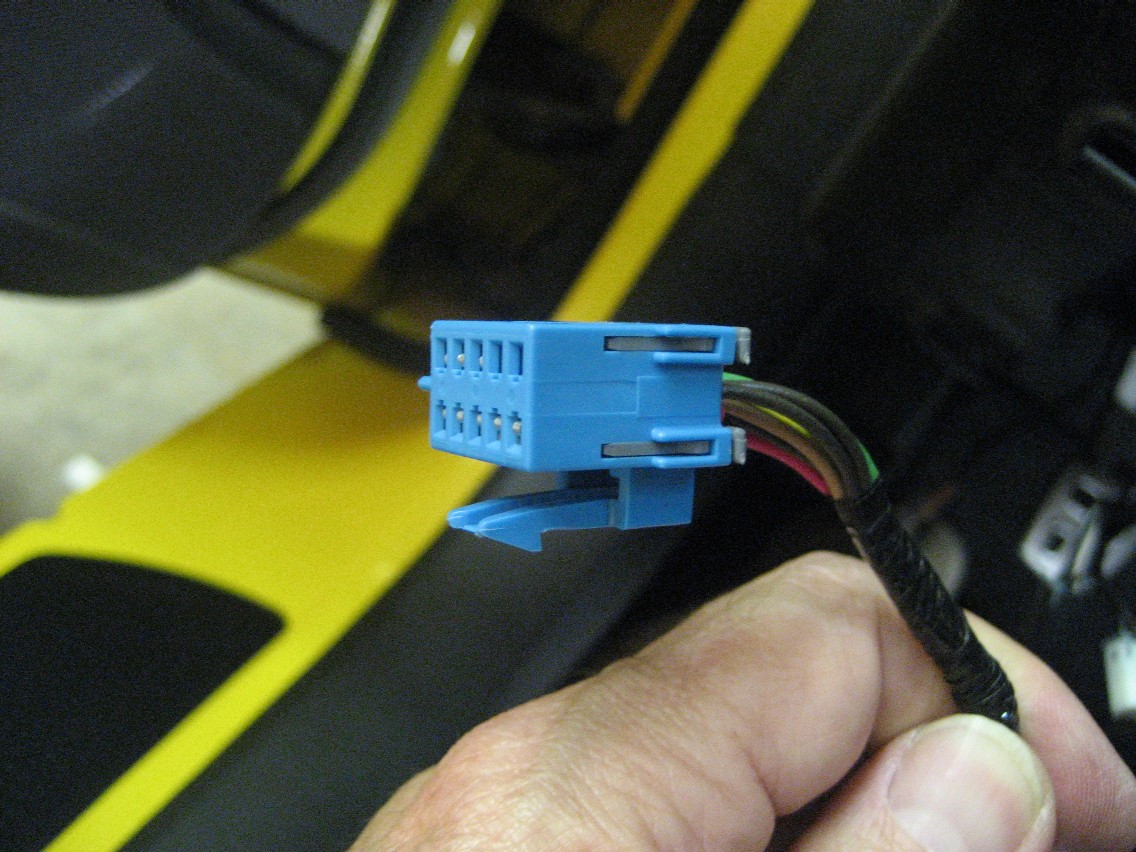
Release the ignition switch with the wires intact by prying on the release tabs, two on each side.
Unplug the other connector and the round module next to the ignition switch.
Once you remove the cluster trim, here's your car without the wheel:
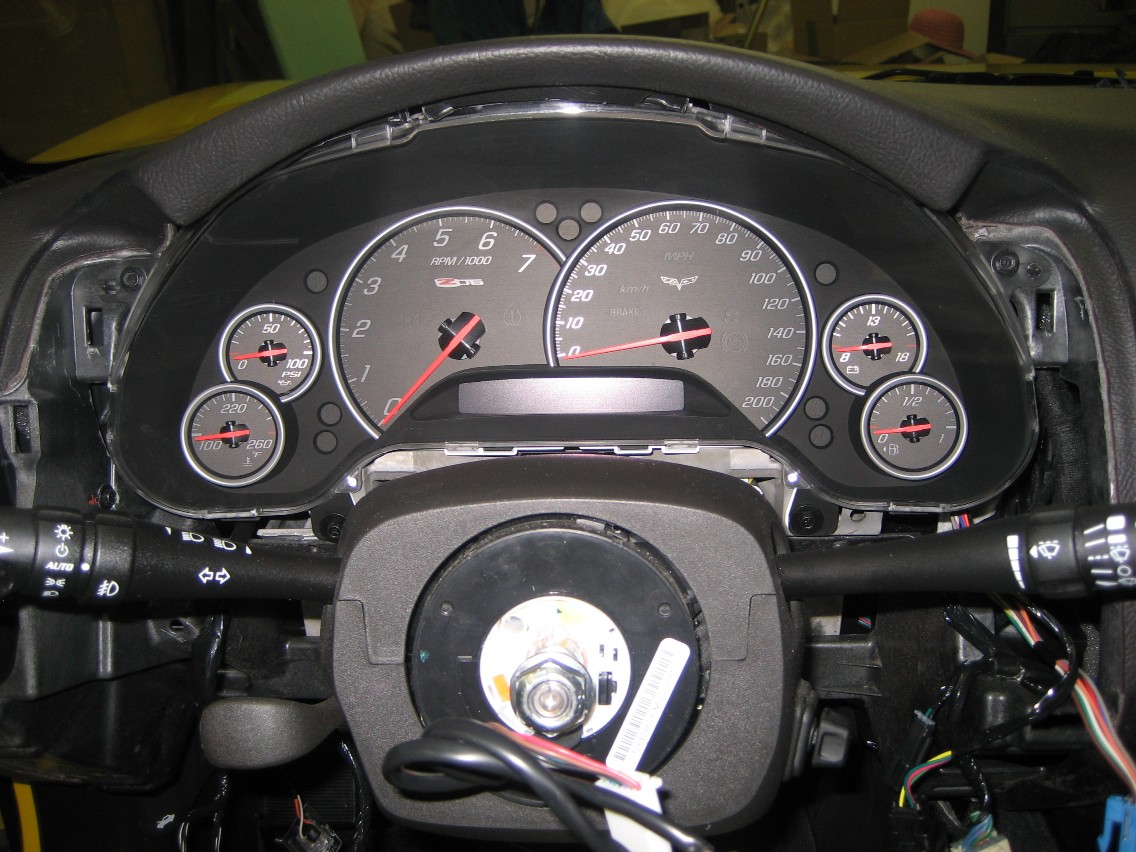
Next, pull the instrument cluster.
There are four 7mm screws holding it in place. You can see the top two in the above photo. The bottom two are just above the turn signal and wiper levers.
Pull out the cluster and unplug the connectors.
Next, remove the knee bolster from under the dash using a T15 Torx driver on the two screws at the bottom.
Unclip it and remove the electrical connectors.
Remove the aluminum knee bolster bracket with a 7mm socket for the four screws.
Finally, remove the insulator under the dash by pulling down each of the three plastic fasteners (identical to the right side insulator fasteners).
Here's a photo of two electrical connectors to be pulled from the support frame under the steering column:
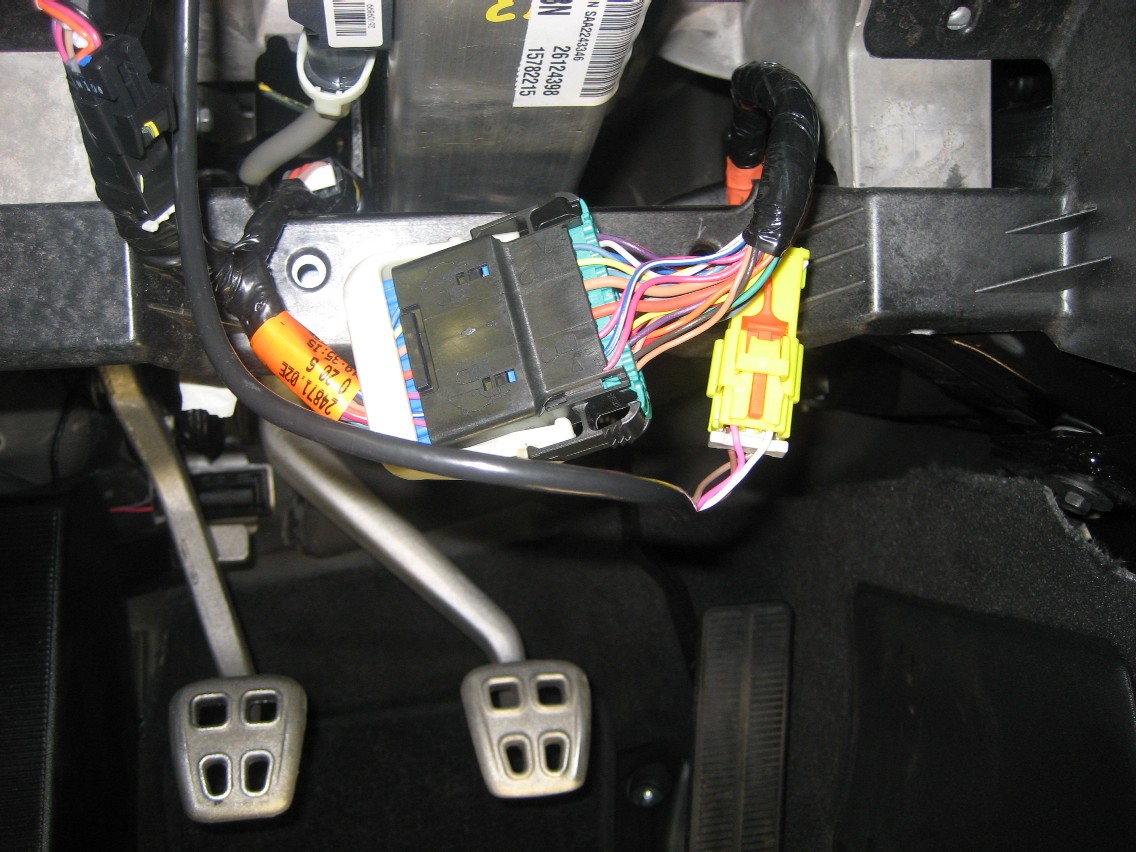
Under the steering column there are a couple of electrical connectors that you must pull out from the plastic support, which is part of the instrument panel frame.
Needle nose pliers make it easy to pull out the connector tabs.
There is no need to unplug the connectors.
Now you are ready to unbolt the left side of the instrument panel.
Here's the left 10mm bolt:
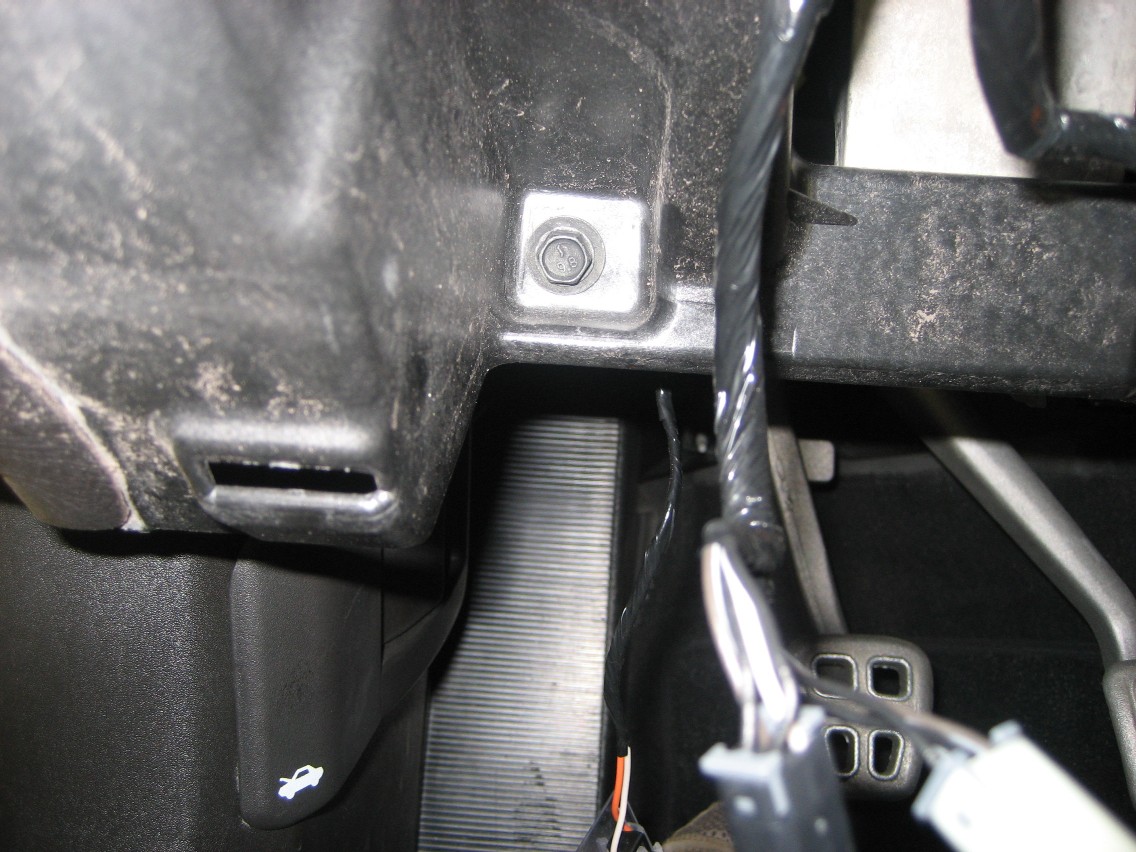
and the left 7mm screw:
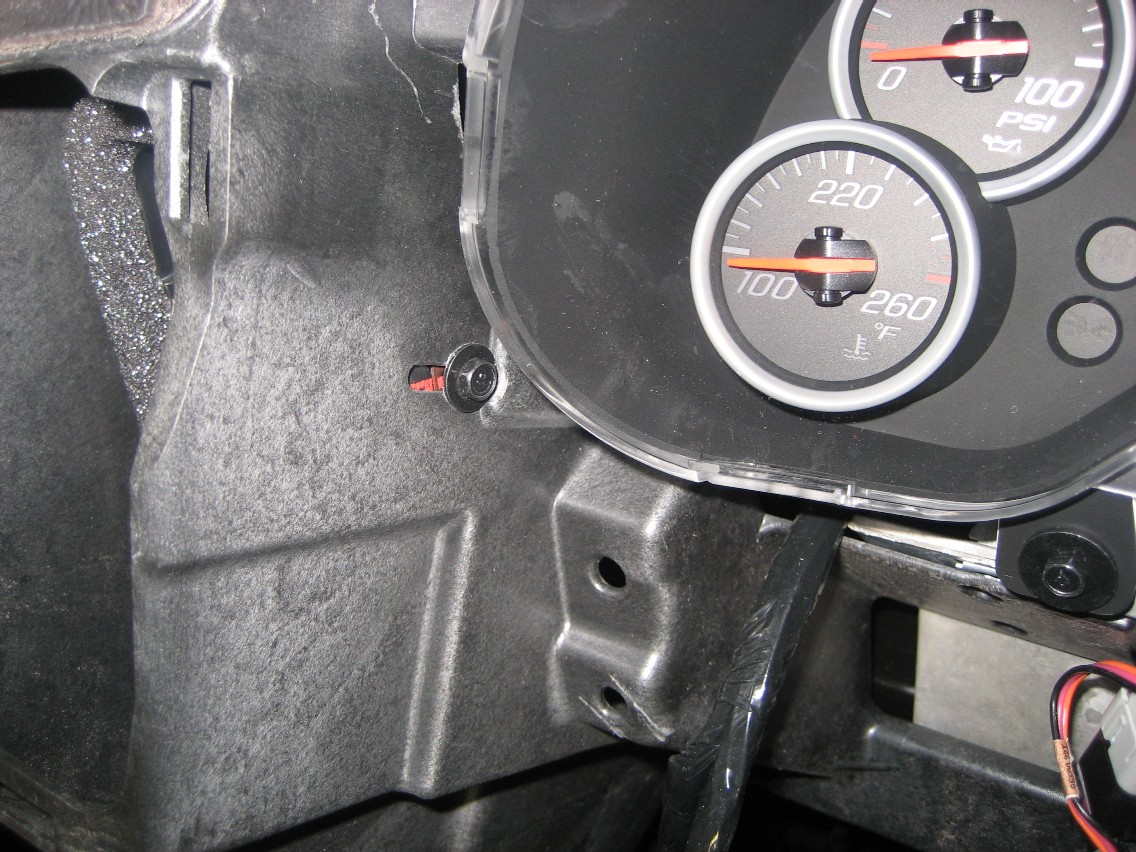
At this point, if you have removed all of the bolts shown in the above photos, the entire instrument panel should now be loose.
Unplug the two connectors for the airbag module and the yaw sensor in the center.
Here is the airbag module connector:
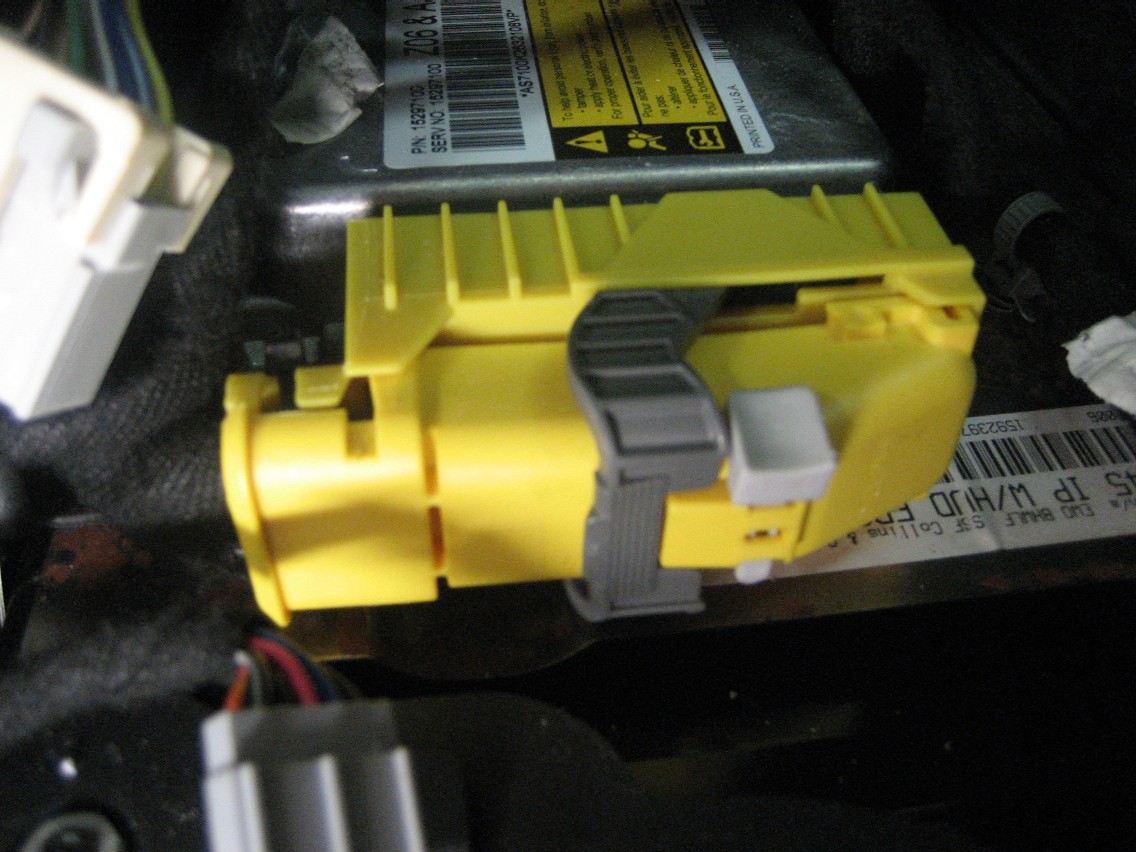
Pull the gray locking pin to release the connector lever:
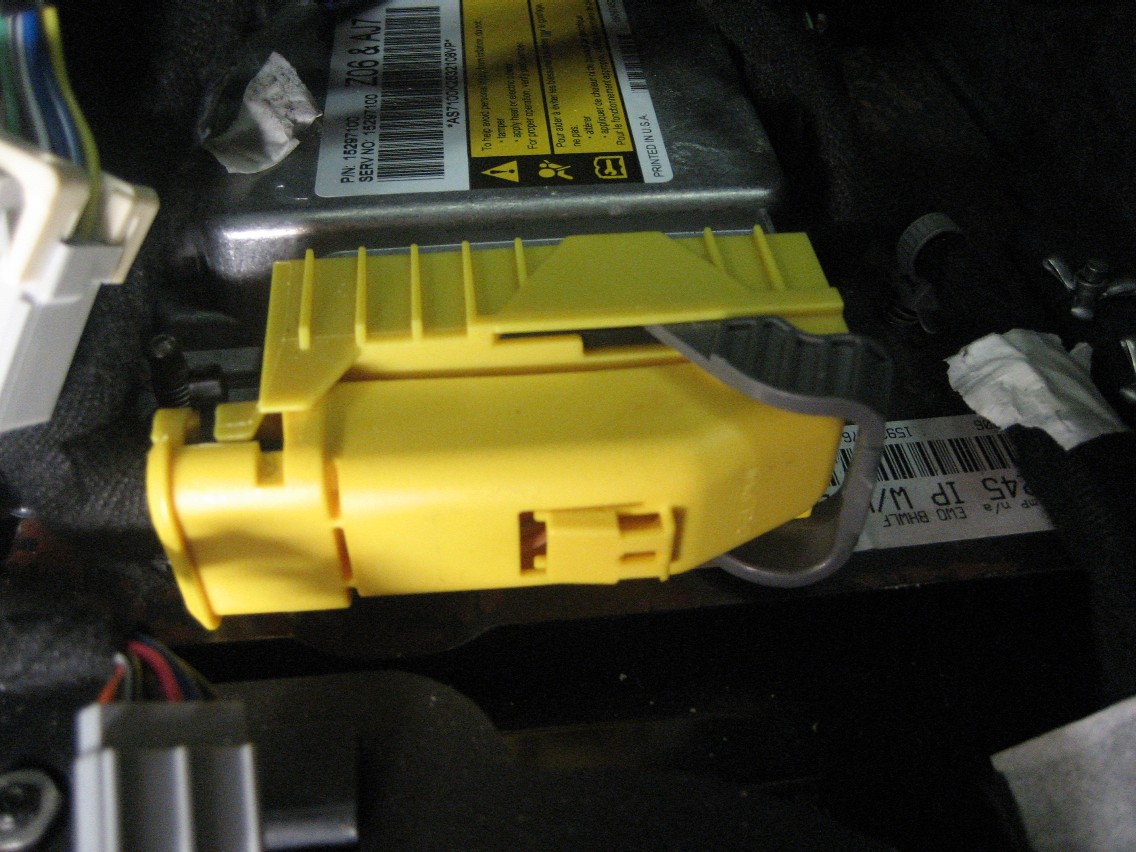
Here's the yaw sensor connector:
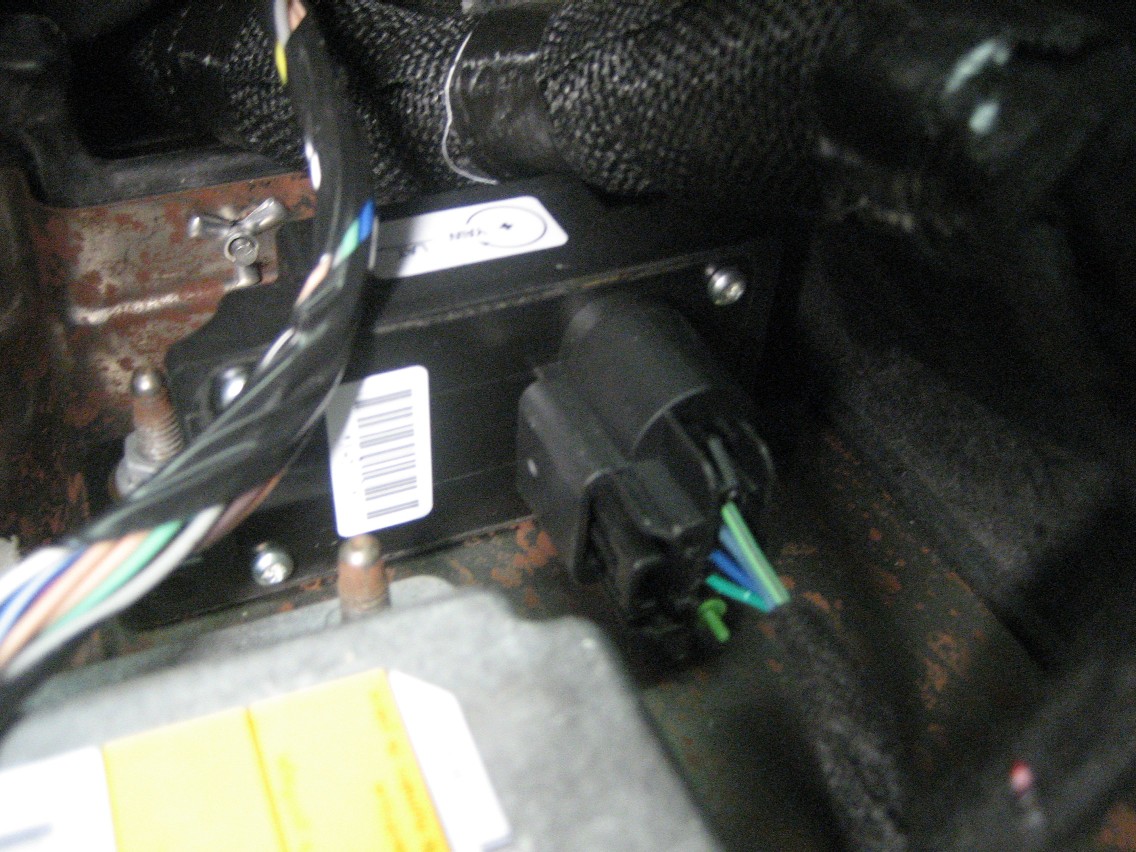
Once you disconnect the airbag module (remember to have the battery disconnected) and the yaw sensor, you can then pull out the instrument panel a few inches and look over all of the wiring harnesses to make sure all are free from getting caught on something.
As you pull it out, feed all of the wiring harnesses back behind the instrument panel so it will be clear for removal.
Have a helper in the passenger seat as you sit in the driver's seat to watch and help pull the panel.
Once the dash is free, your helper can feed it to you out the driver's door.
Here are some photos with the instrument panel removed:
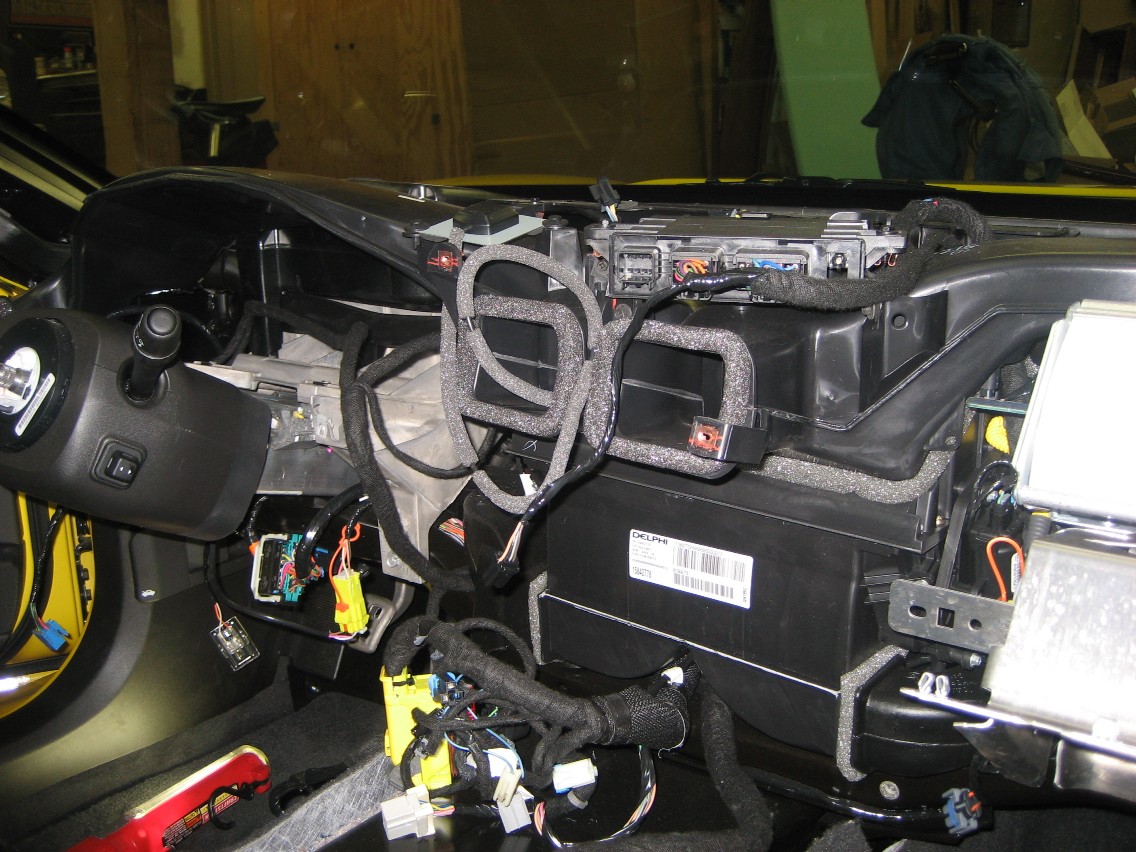
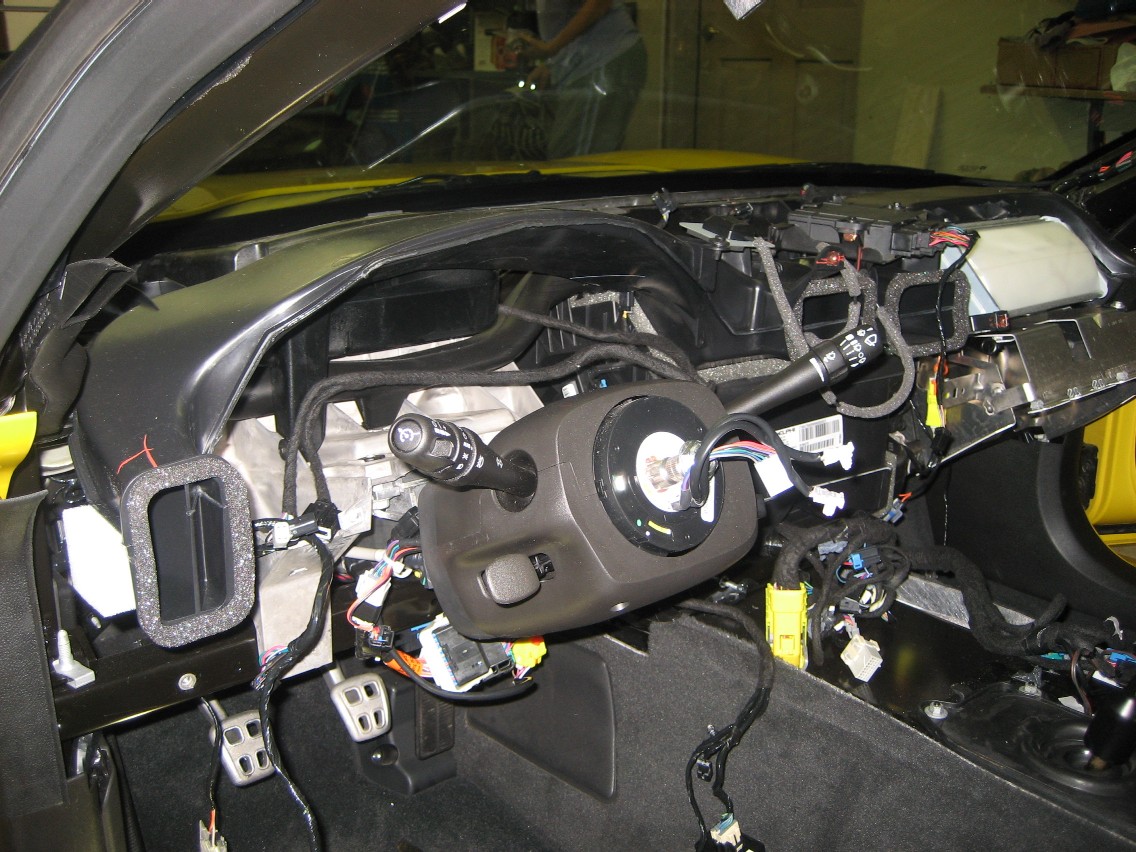
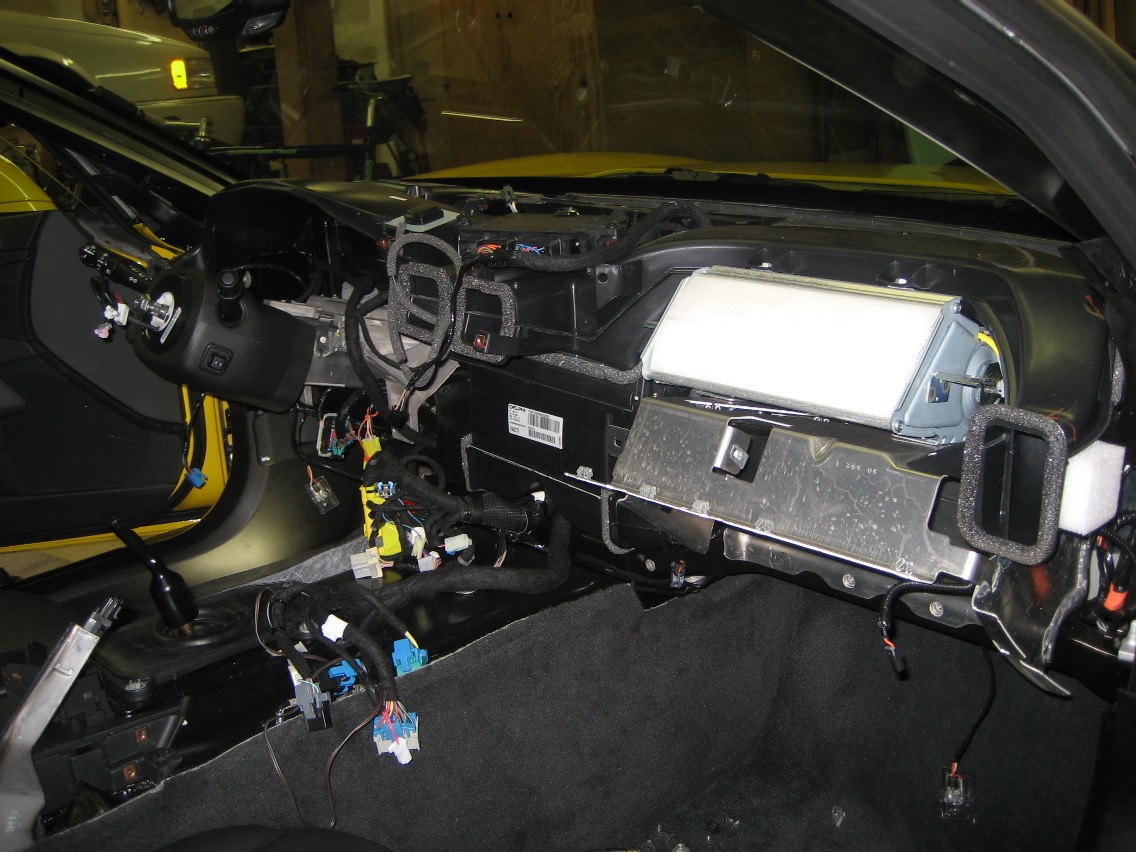
This may look daunting, but it is really quite easy if you follow the procedures above.
There are no special tools needed, so it just takes a few hours of your time.
Prepare the new instrument panel.
Remember at the beginning, we saw that the yaw sensor stud in the new panel was moved to a new location in 2009?
You must remove the left stud because it is right in the way of mounting your earlier sensor. This isn't particularly easy because it is spot welded to the steel frame in three places. You must break those spot weld to get it loose.
I used a socket on the bottom of the panel to support the steel frame and pounded the stud (with three nuts on the top) down through the frame. One of the three spot welds broke, and then I bent the stud back a forth a few times to break the other two welds.
Note of interest:
When I first started investigating the possibility of obtaining a new 3LZ instrument panel, I saw it in a late 2008 model. I don't know for sure, but the part number for an ebony leather panel for an '08 model was 25938303. I am assuming that panel had the yaw sensor stud in the earlier location - so that would be the part to choose if you could get it. But I was told the 2009 part was the only one currently available, and it was "different" than the 2008 part. I am assuming the difference is this stud location. You might want to research this and if the earlier dash could be obtained, it might save you the trouble of moving the stud.
Notice the "2009" written on the steel frame next to where the yaw sensor is mounted.
Here is a photo of the steel frame with the stud removed:
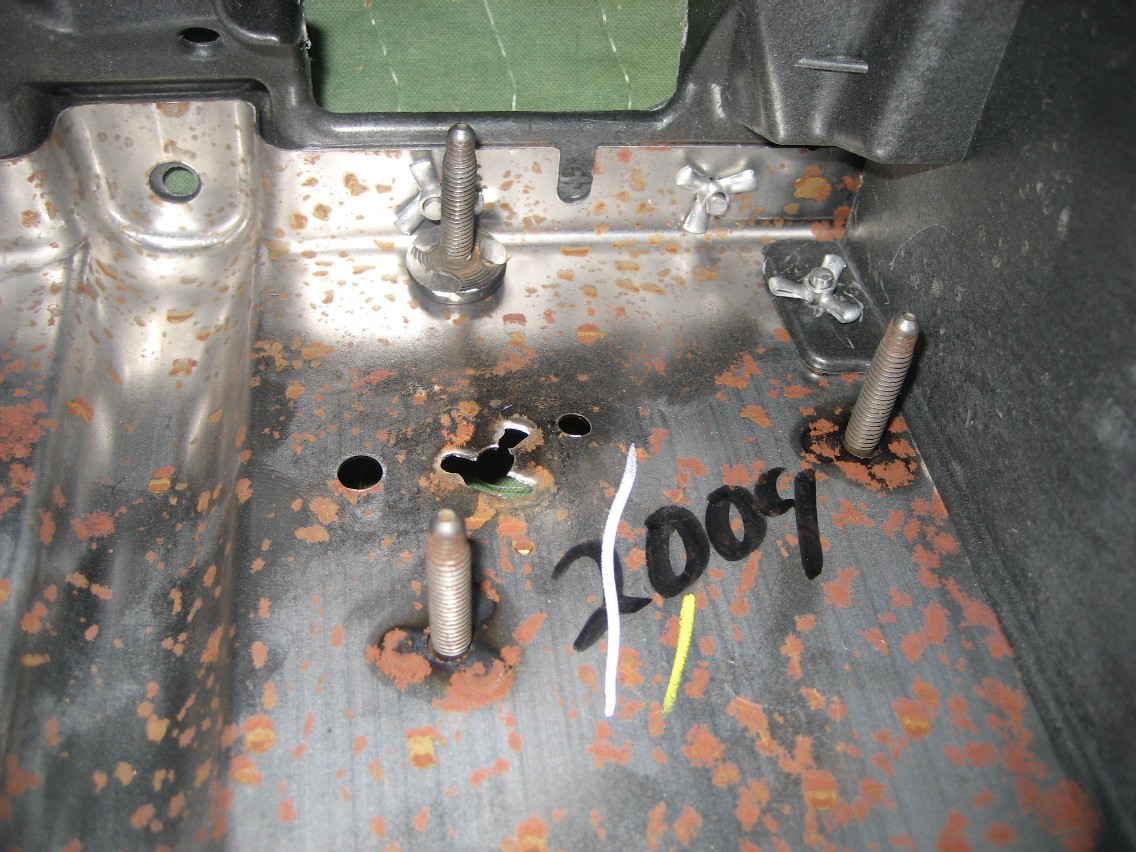
I ground off the remaining weld on the stud as shown above.
It now needs to be mounted in the hole on the left. I chose to use some epoxy to mount the stud in the new location:
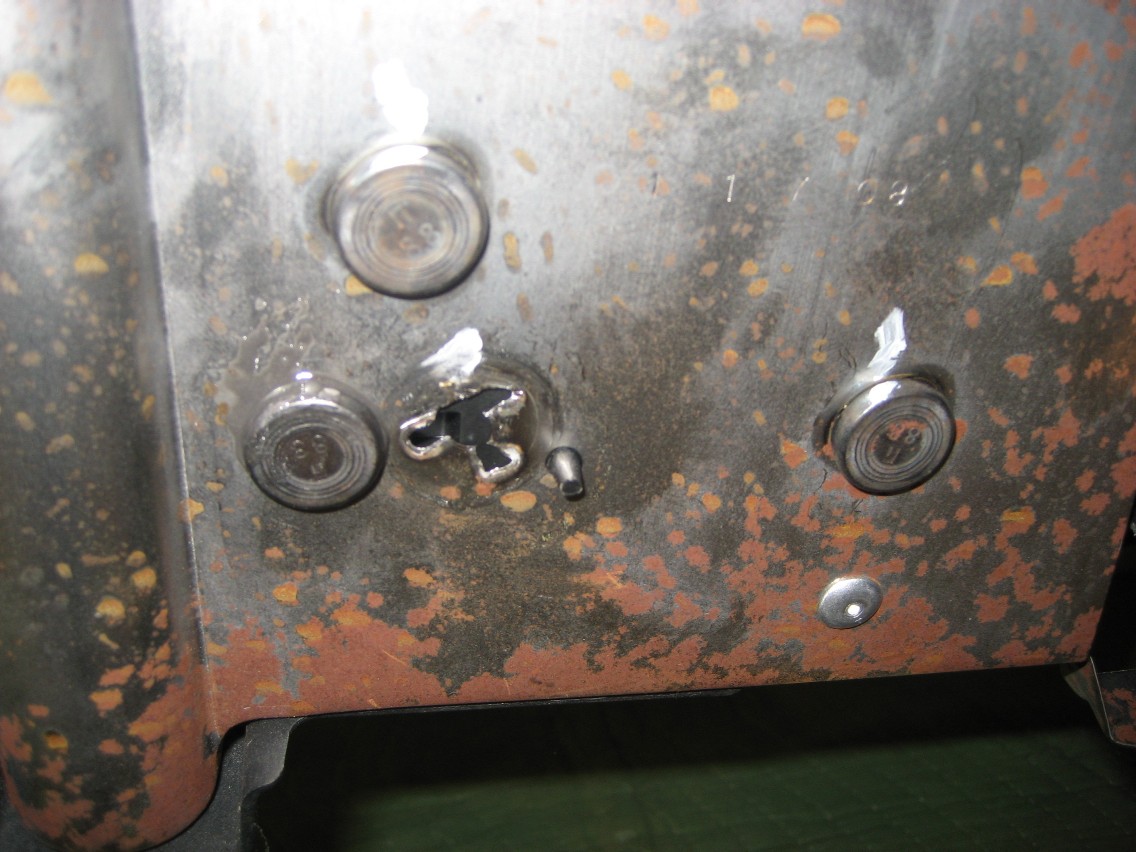
In the above photo, the stud is epoxied in the hole and the yaw sensor is mounted with the locating tab through the center hole.
Here's a photo from the top:
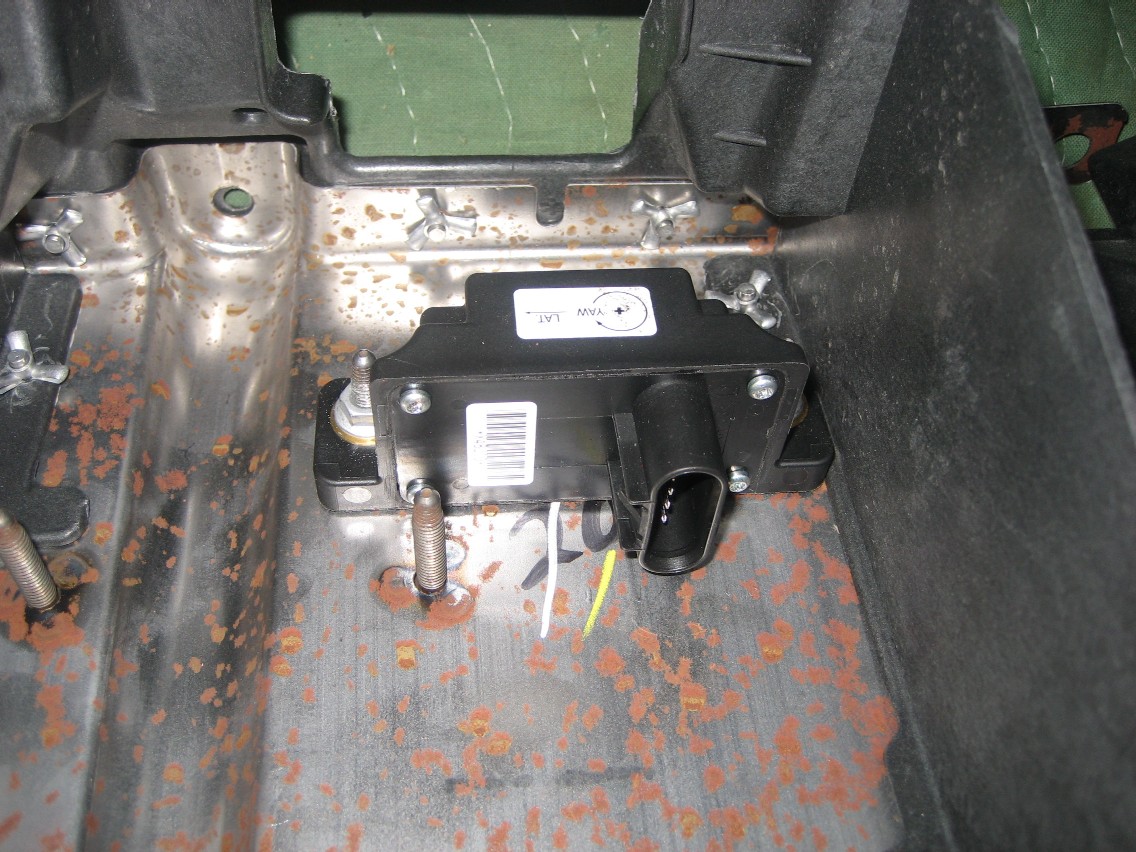
Mount the airbag module and you are ready to install the new instrument panel:
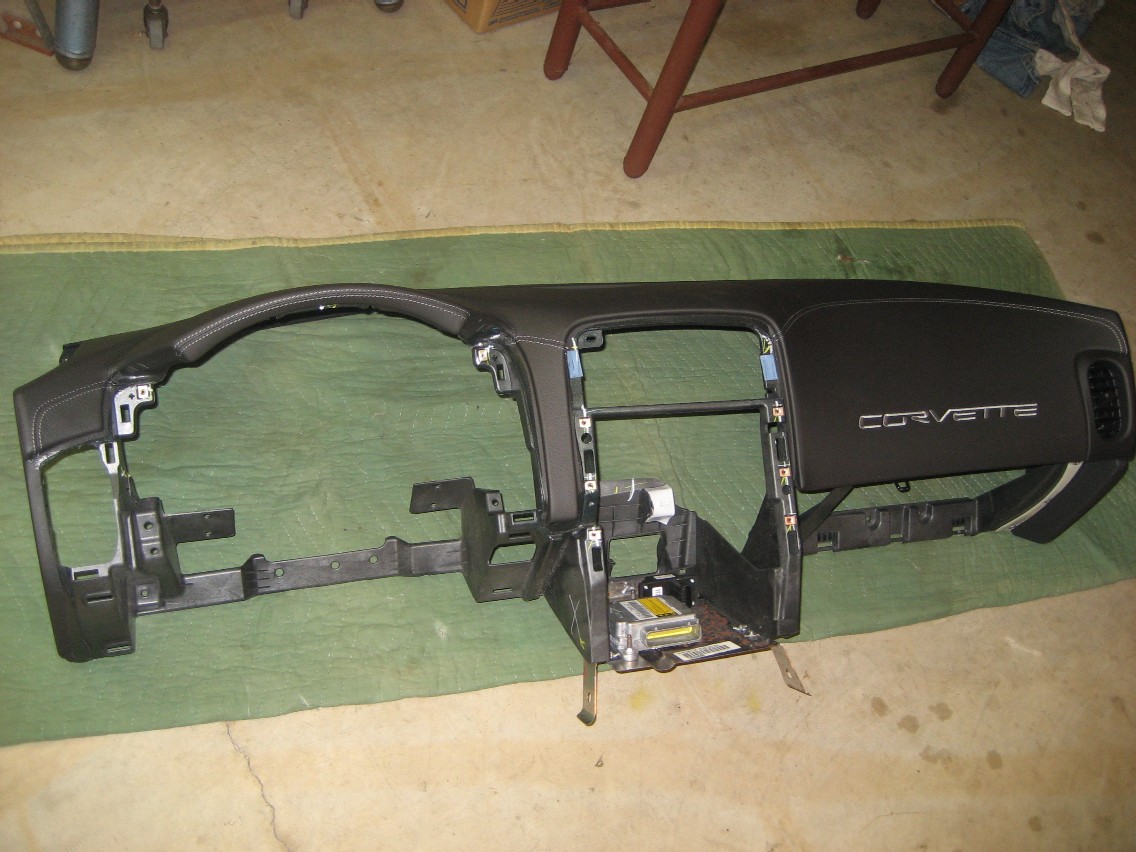
And another photo of the left section:
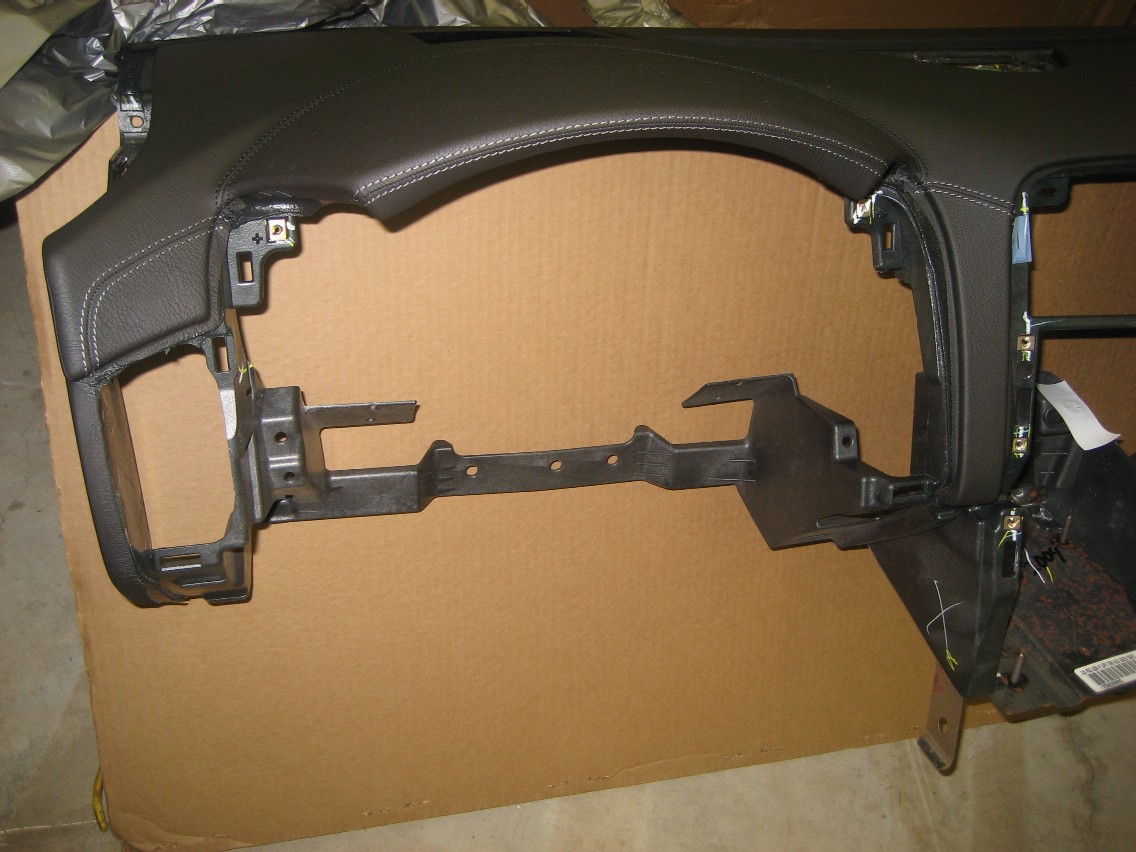
Installation
To install it, you simply do the reverse of the removal procedure. Feed the instrument panel to your helper in the passenger seat.
While you sit in the driver's seat, get it in place and start to feed the center wiring harness through the hole in the back.
Feed the large radio and heater harness in from the back to the right of the center frame - just like when it was removed.
As you move it closer to its installed position, feed the wiring under the steering column in front of the plastic support bracket (shown in the photo above with the three holes in it).
You should then be able to move the panel onto the two upper studs next to the roof pillars.
As you push it in place, make sure all electrical wiring is free and in the proper position.
You can then snug up the two upper nuts on the long studs next to the roof pillars.
Next, install the 10mm bolts in the passenger side airbag module, then the remaining 10mm bolts and 7mm screws.
The new dash should now be in place.
Reinstall the glove compartment trim and the glove box. (Don't forget the wiring that goes into the keyfob slot in the trim.)
Reinstall the knee bolster after pushing in the connectors under the steering column.
Reinstall the left and right insulating panels.
Reinstall the instrument cluster and trim.
Reinstall the steering wheel and airbag.
Reinstall the radio (or Nav unit) and the HVAC control.
Reinstall the center console and the ebrake boot.
Reinstall the speaker, defroster grill, and the windshield pillar trim.
**************
All of this reinstallation will only take an hour or
two. Most of the work is getting the dash out because you have to fiddle
with the electrical connectors getting them apart. They snap back together
almost instantly.
Enjoyment
Here are a few photos of the new leather dash in place:

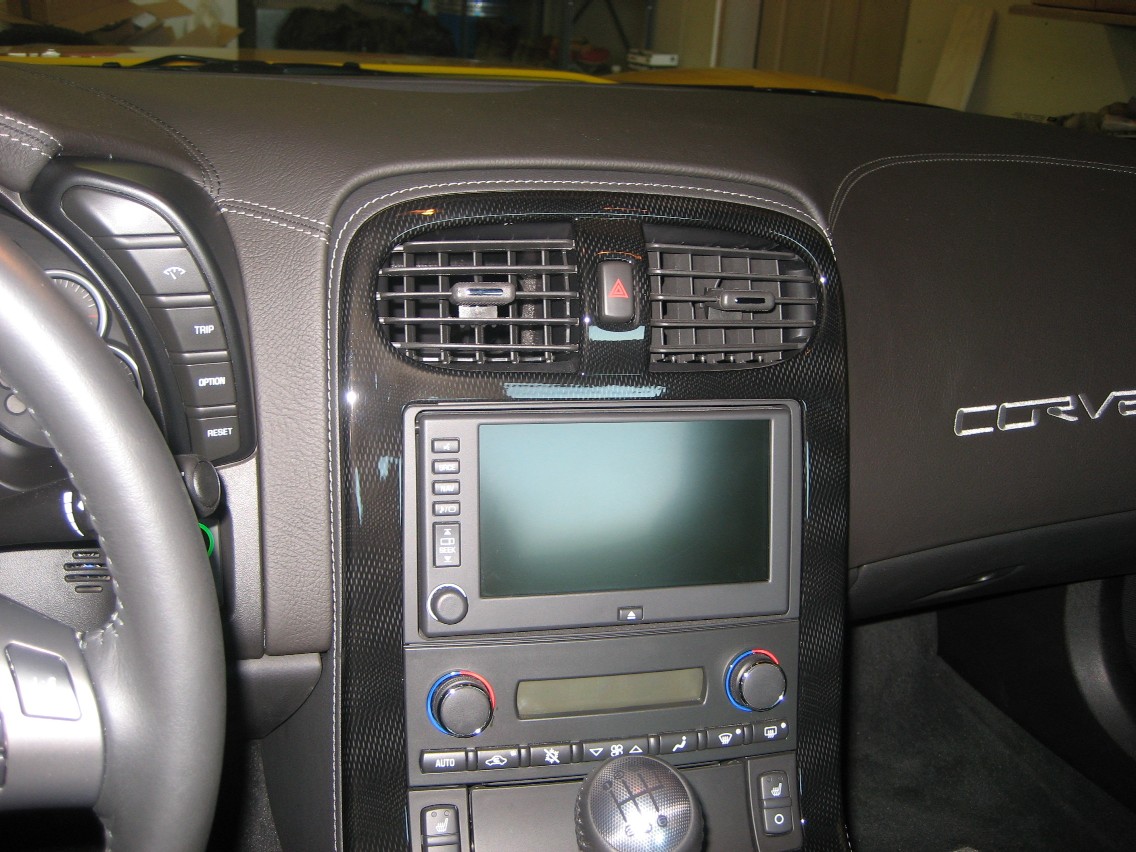
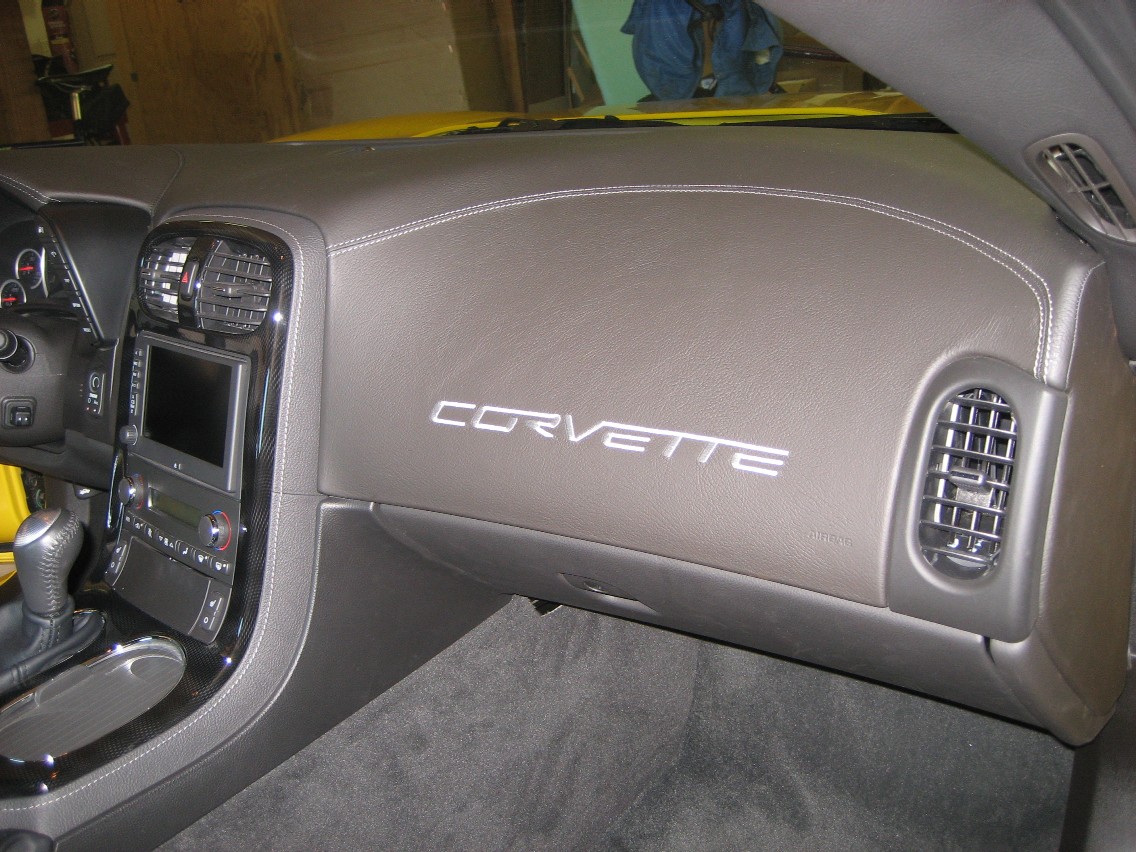
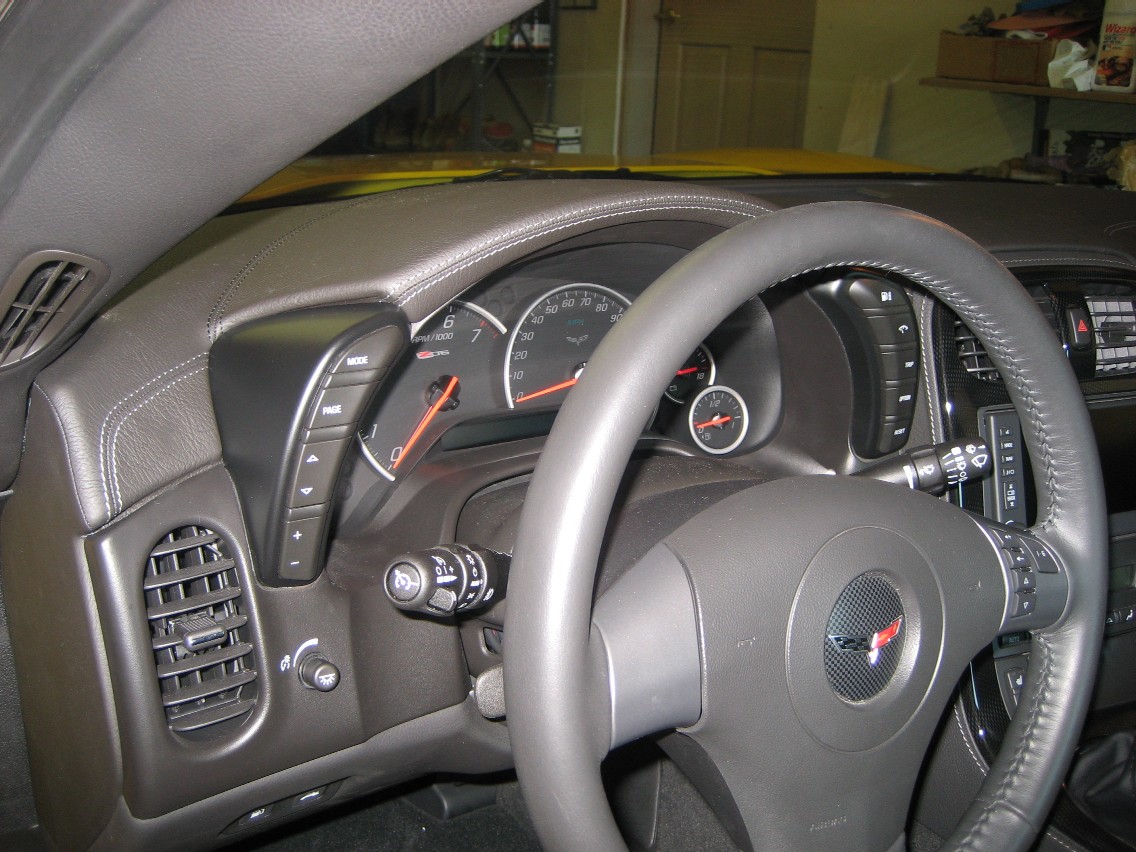
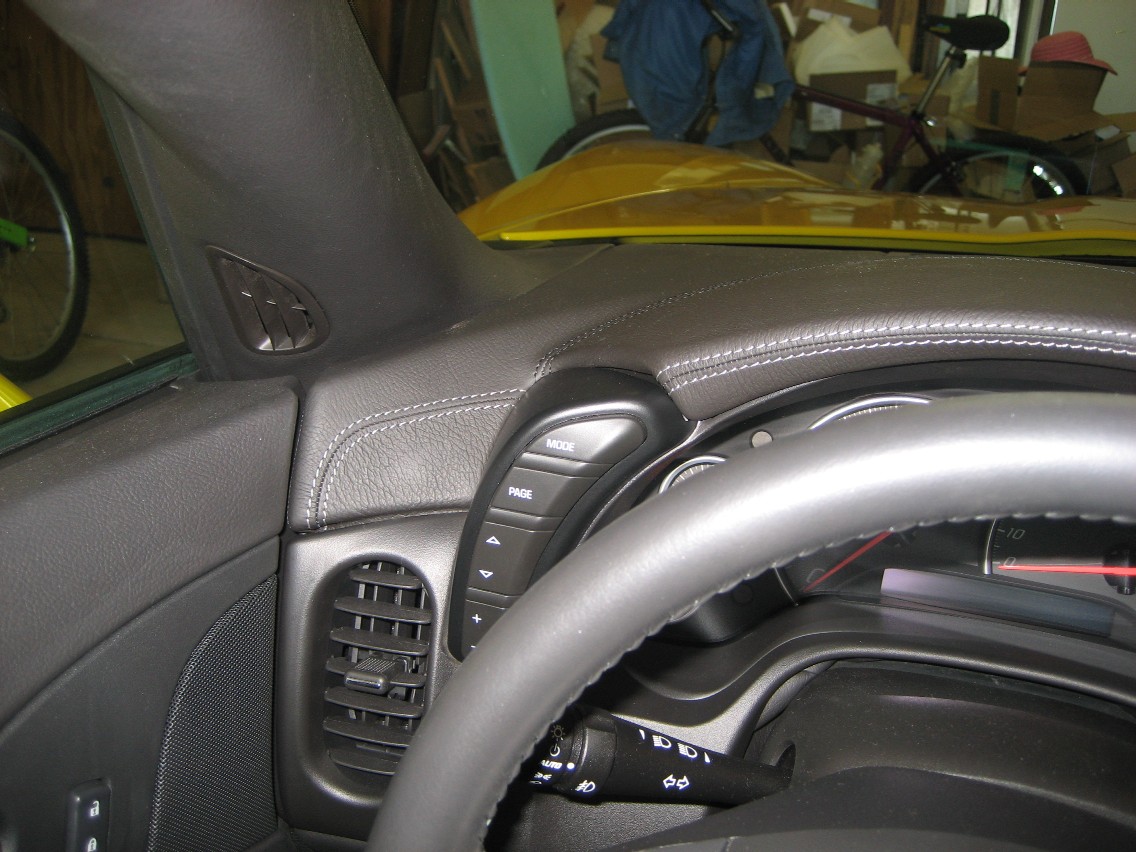
Next Project
My next project is leather covering the door panels.
I have the two leather door pulls:
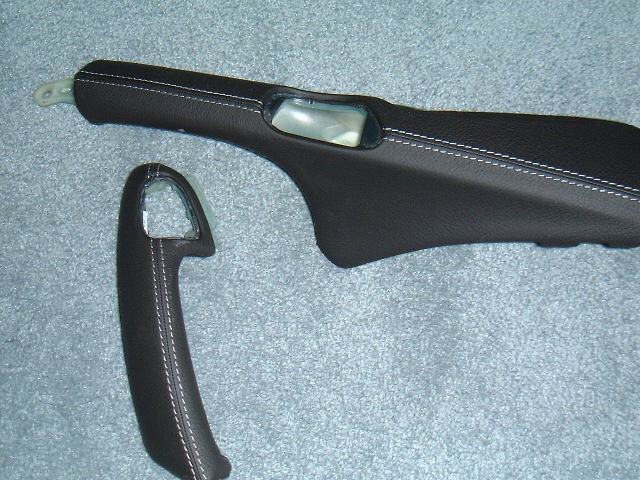
They are part numbers 15895463 and 15895477.
Since they are part of the 3LZ or 4LT upscale packages, they match the leather dash perfectly.
But I would like to have leather on the entire door panel, not just the top part like the 3LZ or 4LT panels.
So I'll be checking with Gerardo at DS Vettes to see what options I have.
Update 3/24/09:
Here are some photos to show the door panels after I installed the leather I got from Gerardo:
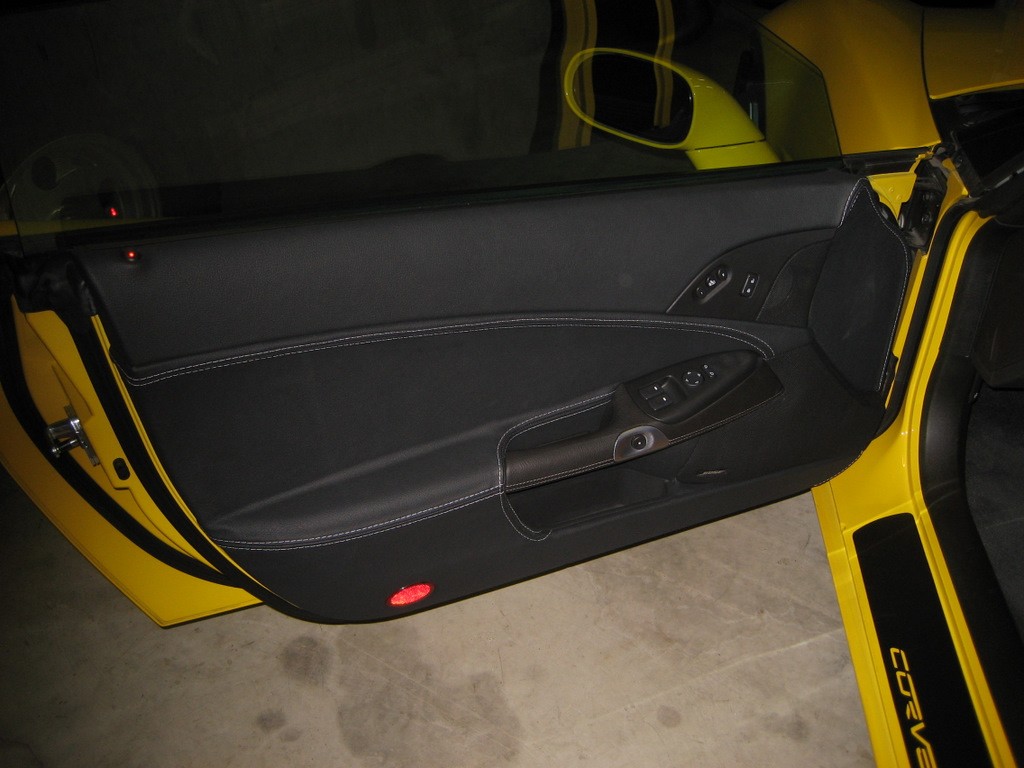
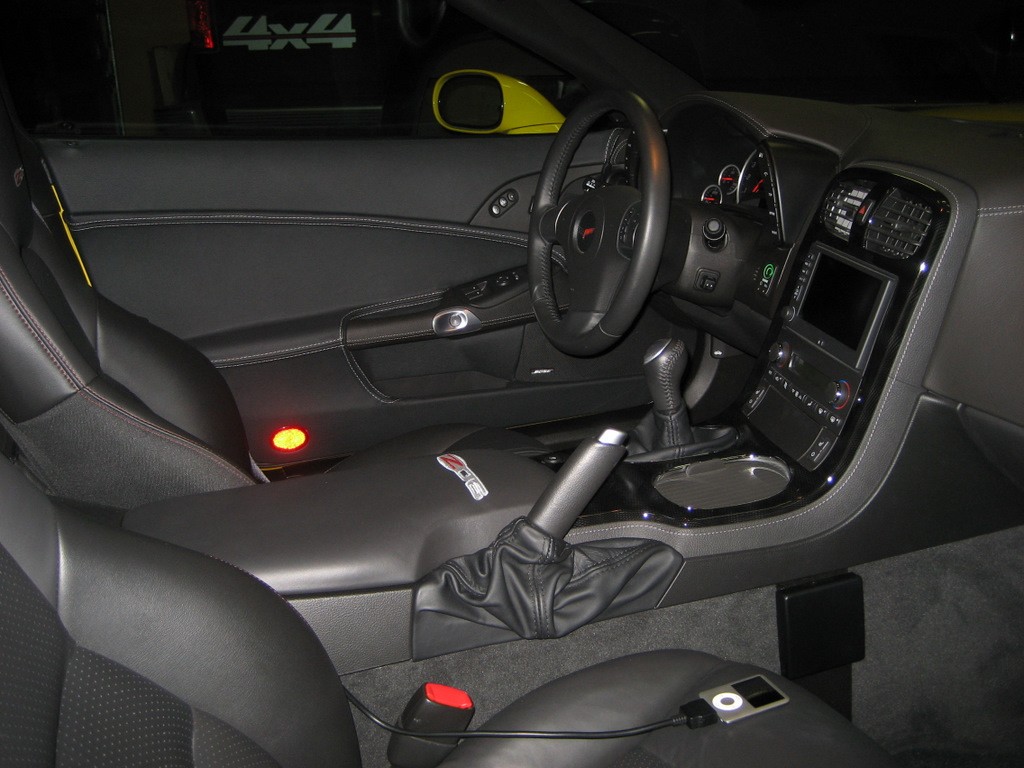
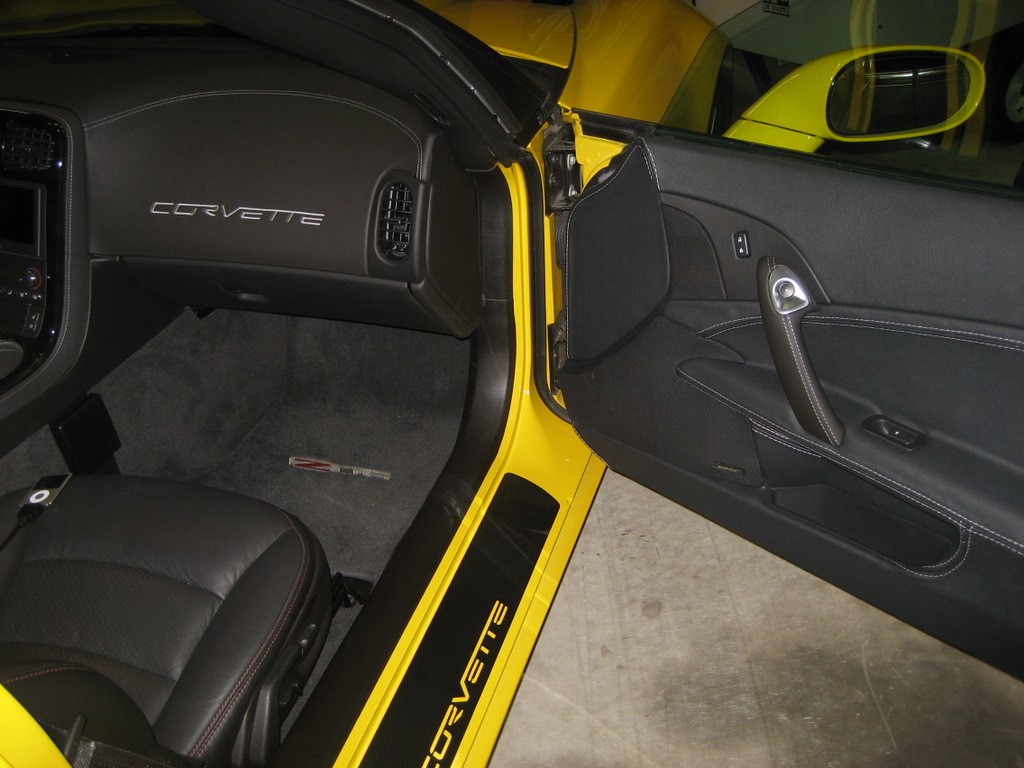
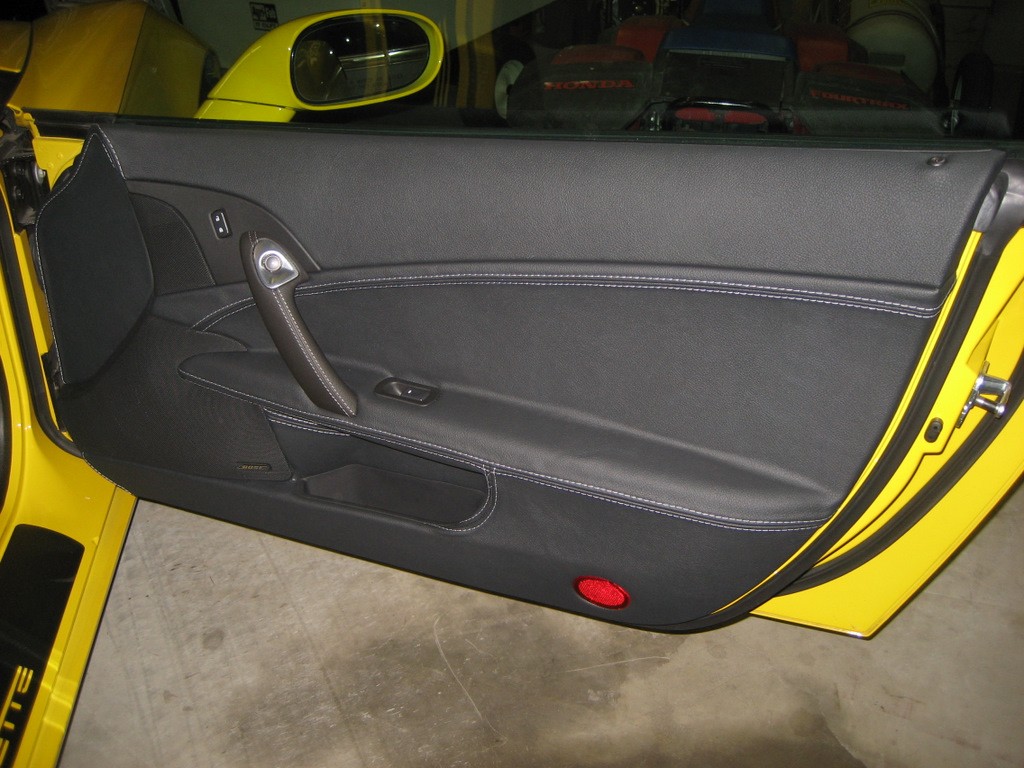
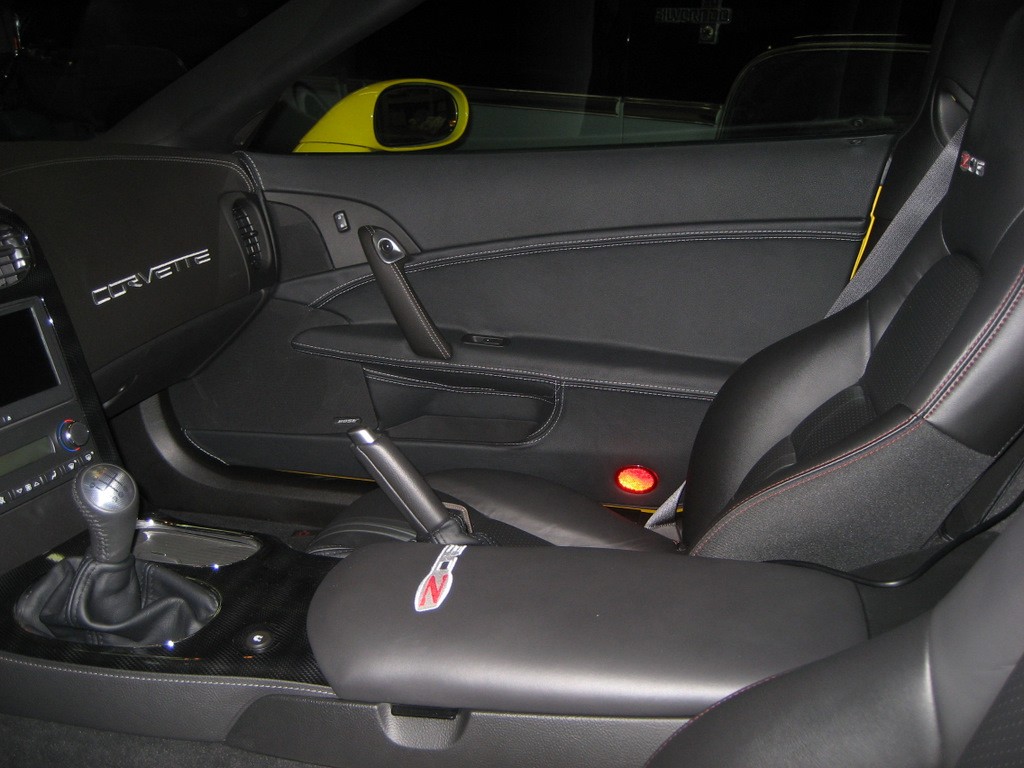
The door panels were a lot more work than the dash. The new dash installation was just a lot of unbolting and bolting the new one in place. Covering the door panels with leather required a lot of patience, and thank goodness Gerardo was generously willing to offer me advice.